
Monsters
Sahuagin - Swarm
SAHUAGIN
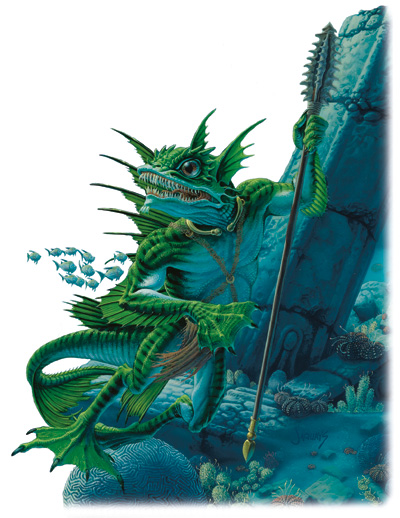 Medium Monstrous Humanoid (Aquatic) Hit Dice: 2d8+2 (11 hp) Initiative: +1 Speed: 30 ft. (6 squares), swim
60 ft. Armor Class: 16 (+1 Dex,
+5
natural), touch 11, flat-footed 15 Base
Attack/Grapple: +2/+4 Attack:
Talon +4 melee (1d4+2) or
trident +4 melee (1d8+3) or heavy crossbow +3 ranged (1d10/19–20)
Full Attack: Trident +4 melee
(1d8+3) and bite +2 melee (1d4+1); or 2 talons +4 melee (1d4+2) and
bite +2 melee (1d4+1); or heavy crossbow +3 ranged (1d10/19–20) Space/Reach: 5 ft./5 ft. Special Attacks: Blood frenzy,
rake 1d4+1 Special Qualities:
Blindsense 30
ft., darkvision 60 ft., freshwater sensitivity, light blindness, speak
with sharks, water dependent Saves:
Fort +3, Ref +4, Will +4 Abilities:
Str 14, Dex 13, Con
12, Int 14, Wis 13, Cha 9 Skills:
Handle Animal +4*, Hide
+6*, Listen +6*, Profession (hunter) +1*, Ride +3, Spot +6*, Survival
+1* Feats: Great Fortitude,
MultiattackB Environment: Warm
aquatic Organization: Solitary,
pair,
team (5–8), patrol (11–20 plus 1 3rd-level lieutenant and 1–2 sharks),
band (20–80 plus 100% noncombatants plus 1 3rd-level lieutenant and 1
4th-level chieftain per 20 adults plus 1–2 sharks), or tribe (70–160
plus 100% noncombatants plus 1 3rd-level lieutenant per 20 adults, 1
4th-level chieftain per 40 adults, 9 4th-level guards, 1–4
underpriestesses of 3rd–6th level, 1 7th-level priestess, and 1 baron
of 6th–8th level plus 5–8 sharks) Challenge
Rating: 2 Treasure: Standard
Alignment: Usually lawful evil
Advancement: 3–5 HD (Medium),
6–10 HD (Large), or by character class Level
Adjustment: +2 (+3 if
four-armed)
Medium Monstrous Humanoid (Aquatic) Hit Dice: 2d8+2 (11 hp) Initiative: +1 Speed: 30 ft. (6 squares), swim
60 ft. Armor Class: 16 (+1 Dex,
+5
natural), touch 11, flat-footed 15 Base
Attack/Grapple: +2/+4 Attack:
Talon +4 melee (1d4+2) or
trident +4 melee (1d8+3) or heavy crossbow +3 ranged (1d10/19–20)
Full Attack: Trident +4 melee
(1d8+3) and bite +2 melee (1d4+1); or 2 talons +4 melee (1d4+2) and
bite +2 melee (1d4+1); or heavy crossbow +3 ranged (1d10/19–20) Space/Reach: 5 ft./5 ft. Special Attacks: Blood frenzy,
rake 1d4+1 Special Qualities:
Blindsense 30
ft., darkvision 60 ft., freshwater sensitivity, light blindness, speak
with sharks, water dependent Saves:
Fort +3, Ref +4, Will +4 Abilities:
Str 14, Dex 13, Con
12, Int 14, Wis 13, Cha 9 Skills:
Handle Animal +4*, Hide
+6*, Listen +6*, Profession (hunter) +1*, Ride +3, Spot +6*, Survival
+1* Feats: Great Fortitude,
MultiattackB Environment: Warm
aquatic Organization: Solitary,
pair,
team (5–8), patrol (11–20 plus 1 3rd-level lieutenant and 1–2 sharks),
band (20–80 plus 100% noncombatants plus 1 3rd-level lieutenant and 1
4th-level chieftain per 20 adults plus 1–2 sharks), or tribe (70–160
plus 100% noncombatants plus 1 3rd-level lieutenant per 20 adults, 1
4th-level chieftain per 40 adults, 9 4th-level guards, 1–4
underpriestesses of 3rd–6th level, 1 7th-level priestess, and 1 baron
of 6th–8th level plus 5–8 sharks) Challenge
Rating: 2 Treasure: Standard
Alignment: Usually lawful evil
Advancement: 3–5 HD (Medium),
6–10 HD (Large), or by character class Level
Adjustment: +2 (+3 if
four-armed)
Most sahuagin feature green coloration, darker along the back and lighter on the belly. Many have dark stripes, bands, or spots, but these tend to fade with age. An adult male sahuagin stands roughly 6 feet tall and weighs about 200 pounds.
Sahuagin are the natural enemy of aquatic elves. The two cannot coexist peacefully: Wars between them are prolonged, bloody affairs that sometimes interfere with shipping and maritime trade. Sahuagin have an only slightly less vehement hatred for tritons.
Sahuagin speak their own language, Sahuagin. Thanks to their high Intelligence scores, most sahuagin also speak two bonus languages, usually Common and Aquan.
COMBAT
Sahuagin are savage fighters, asking for and giving no quarter. When swimming, a sahuagin tears with its feet as it strikes with its talons or a weapon. About half of any group of sahuagin are also armed with nets.
Blindsense (Ex): A sahuagin can locate creatures underwater within a 30-foot radius. This ability works only when the sahuagin is underwater.
Blood Frenzy: Once per day a sahuagin that takes damage in combat can fly into a frenzy in the following round, clawing and biting madly until either it or its opponent is dead. It gains +2 Constitution and +2 Strength, and takes a –2 penalty to Armor Class. A sahuagin cannot end its frenzy voluntarily.
Rake (Ex): Attack bonus +2 melee, damage 1d4+1. A sahuagin also gains two rake attacks when it attacks while swimming.
Freshwater Sensitivity (Ex): A sahuagin fully immersed in fresh water must succeed on a DC 15 Fortitude save or become fatigued. Even on a success, it must repeat the save attempt every 10 minutes it remains immersed.
Light Blindness (Ex): Abrupt exposure to bright light (such as sunlight or a daylight spell) blinds sahuagin for round. On subsequent rounds, they are dazzled while operating in bright light.
Speak with Sharks (Ex): Sahuagin can communicate telepathically with sharks up to 150 feet away. The communication is limited to fairly simple concepts such as “food,” “danger,” and “enemy.” Sahuagin can use the Handle Animal skill to befriend and train sharks.
Water Dependent (Ex): Sahuagin can survive out of the water for 1 hour per 2 points of Constitution (after that, refer to the drowning rules on page 304 of the Dungeon Master ’s Guide).
Skills: A sahuagin has a +8 racial bonus on any Swim check to perform some special action or avoid a hazard. It can always choose to take 10 on a Swim check, even if distracted or endangered. It can use the run action while swimming, provided it swims in a straight line.
*Underwater, a sahuagin has a +4 racial bonus on Hide, Listen, and Spot checks.
*A sahuagin has a +4 racial bonus on Survival and Profession (hunter) checks within 50 miles of its home.
*A sahuagin has a +4 racial bonus on Handle Animal checks when working with sharks.
SAHUAGIN MUTANTS
About one in two hundred sahuagin has four arms. Such creatures can make four claw attacks or use extra weapons, in addition to the claw and bite attacks.
If a community of aquatic elves is located within 100 miles of a sahuagin community, about one in one hundred sahuagin looks just like an aquatic elf. These creatures, called malenti, have a swim speed of 40 feet, can remain out of water for 1 hour per point of Constitution, and have freshwater sensitivity and light sensitivity (dazzled in bright light). Malenti have no natural attacks. They are otherwise identical with sahuagin.
SALAMANDER
| Flamebrother Salamander Small Outsider (Extraplanar, Fire) |
Average Salamander Medium Outsider (Extraplanar, Fire) |
Noble Salamander Large Outsider (Extraplanar, Fire) |
|||
|---|---|---|---|---|---|
| Hit Dice: | 4d8+8 (26 hp) | 9d8+18 (58 hp) | 15d8+45 (112 hp) | ||
| Initiative: | +1 | +1 | +1 | ||
| Speed: | 20 ft. (4 squares) | 20 ft. (4 squares) | 20 ft. (4 squares) | ||
| Armor Class: | 19 (+1 size, +1 Dex, +7 natural), touch 12, flat-footed 18 | 18 (+1 Dex, +7 natural), touch 11, flat-footed 17 | 18 (–1 size, +1 Dex, +8 natural), touch 10, flat-footed 17 | ||
| Base Attack/Grapple: | +4/+1 | +9/+11 | +15/+25 | ||
| Attack: | Spear +6 melee (1d6+1/x3 plus 1d6 fire) | Spear +11 melee (1d8+3/x3 plus 1d6 fire) | +3 longspear +23 melee (1d8+9/x3 plus 1d8 fire) | ||
| Full Attack: | Spear +6 melee (1d6+1/x3 plus 1d6 fire) and tail slap +4 melee (1d4 plus 1d6 fire) | Spear +11/+6 melee (1d8+3/x3 plus 1d6 fire) and tail slap +9 melee (2d6+1 plus 1d6 fire) | +3 longspear +23/+18/+13 melee (1d8+9/x3 plus 1d8 fire) and tail slap +18 melee (2d8+3 plus 1d8 fire) | ||
| Space/Reach: | 5 ft./5 ft. | 5 ft./5 ft. (10 ft. with tail) | 10 ft./10 ft. (20 ft. with tail or longspear) | ||
| Special Attacks: | Constrict 1d4 plus 1d6 fire, heat, improved grab | Constrict 2d6+1 plus 1d6 fire, heat, improved grab | Constrict 2d8+3 plus 1d8 fire, heat, improved grab, spell-like abilities | ||
| Special Qualities: | Darkvision 60 ft., immunity to fire, vulnerability to cold | Damage reduction 10/magic, darkvision 60 ft., immunity to fire, vulnerability to cold | Damage reduction 15/magic, darkvision 60 ft., immunity to fire, vulnerability to cold | ||
| Saves: | Fort +6, Ref +5, Will +6 | Fort +8, Ref +7, Will +8 | Fort +12, Ref +10, Will +11 | ||
| Abilities: | Str 12, Dex 13, Con 14, Int 14, Wis 15, Cha 13 | Str 14, Dex 13, Con 14, Int 14, Wis 15, Cha 13 | Str 22, Dex 13, Con 16, Int 16, Wis 15, Cha 15 | ||
| Skills: | Craft (blacksmithing) +8, Hide +12, Listen +11, Move Silently +6, Spot +11 | Bluff +11, Craft (blacksmithing) +19, Diplomacy +3, Disguise +1 (+3 acting), Hide +11, Intimidate +3, Listen +8, Move Silently +11,Search +12, Spot +8 | Bluff +19, Craft (blacksmithing) +25, Diplomacy +4, Hide +15, Intimidate +4, Listen +13, Move Silently +17, Spot +13 | ||
| Feats: | Alertness, Multiattack | Alertness, Multiattack, Power Attack | Alertness, Cleave, Great Cleave, Multiattack, Power Attack, Skill Focus (Craft [blacksmithing]) | ||
| Environment: | Elemental Plane of Fire | Elemental Plane of Fire | Elemental Plane of Fire | ||
| Organization: | Solitary, pair, or cluster (3–5) | Solitary, pair, or cluster (3–5) | Solitary, pair, or noble party (9–14) | ||
| Challenge Rating: | 3 | 6 | 10 | ||
| Treasure: | Standard (nonflammables only) | Standard (nonflammables only) | Double standard (nonflammables only) and +3 longspear | ||
| Alignment: | Usually evil (any) | Usually evil (any) | Usually evil (any) | ||
| Advancement: | 4–6 HD (Small) | 8–14 HD (Medium) | 16–21 HD (Large); 22–45 HD (Huge) | ||
| Level Adjustment: | +4 | +5 | — |
Salamanders speak Ignan. Some average salamanders and all nobles also speak Common.
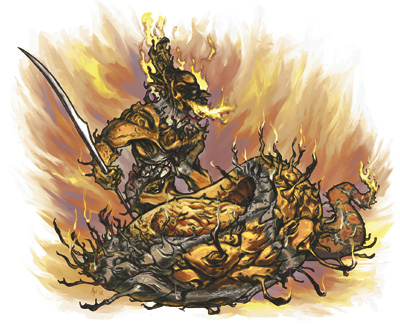
COMBAT
If a salamander has damage reduction, its natural weapons are treated as magic weapons for the purpose of overcoming damage reduction.
Constrict (Ex): A salamander deals automatic tail slap damage (including fire damage) with a successful grapple check. A noble salamander can constrict multiple creatures simultaneously, provided they are all at least two sizes smaller than it.
Heat (Ex): A salamander generates so much heat that its mere touch deals additional fire damage. Salamanders’ metallic weapons also conduct this heat.
Improved Grab (Ex): To use this ability, a salamander must hit a creature of up to one size larger than itself with its tail slap attack. It can then attempt to start a grapple as a free action without provoking an attack of opportunity. If it wins the grapple check, it establishes a hold and can constrict.
Spell-Like Abilities: (Noble salamanders only) 3/day—burning hands (DC 13), fireball (DC 15), flaming sphere (DC 14), wall of fire (DC 16); 1/day—dispel magic, summon monster VII (Huge fire elemental). Caster level 15th. The save DCs are Charisma-based.
Skills: Salamanders have a +4 racial bonus on Craft (blacksmithing) checks.
Feats: Salamanders have the Multiattack feat even though they do not have the requisite three natural weapons.
SATYR
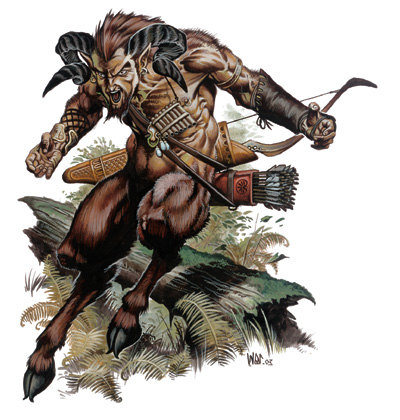 Medium Fey Hit
Dice: 5d6+5 (22 hp) Initiative:
+1 Speed: 40 ft. (8 squares)
Armor Class: 15 (+1 Dex, +4
natural), touch 11, flat-footed 14 Base
Attack/Grapple: +2/+2 Attack:
Head butt +2 melee (1d6)
or shortbow +3 ranged (1d6/x3) Full
Attack: Head butt +2 melee
(1d6) and dagger –3 melee (1d4/19–20); or shortbow +3 ranged (1d6/x3)
Space/Reach: 5 ft./5 ft. Special Attacks: Pipes Special Qualities: Damage
reduction 5/cold iron, low-light vision Saves:
Fort +2, Ref +5, Will +5 Abilities:
Str 10, Dex 13, Con
12, Int 12, Wis 13, Cha 13 Skills:
Bluff
+9, Diplomacy +3,
Disguise +1 (+3 acting), Hide +13, Intimidate +3, Knowledge (nature)
+9, Listen +15, Move Silently +13, Perform (wind instruments) +9, Spot
+15, Survival +1 (+3 aboveground) Feats:
AlertnessB, Dodge, Mobility Environment:
Temperate forests Organization:
Solitary, pair,
band (3–5), or troop (6–11) Challenge
Rating: 2 (without
pipes) or 4 (with pipes) Treasure:
Standard Alignment: Usually
chaotic neutral Advancement:
6–10 HD (Medium) Level Adjustment:
+2
Medium Fey Hit
Dice: 5d6+5 (22 hp) Initiative:
+1 Speed: 40 ft. (8 squares)
Armor Class: 15 (+1 Dex, +4
natural), touch 11, flat-footed 14 Base
Attack/Grapple: +2/+2 Attack:
Head butt +2 melee (1d6)
or shortbow +3 ranged (1d6/x3) Full
Attack: Head butt +2 melee
(1d6) and dagger –3 melee (1d4/19–20); or shortbow +3 ranged (1d6/x3)
Space/Reach: 5 ft./5 ft. Special Attacks: Pipes Special Qualities: Damage
reduction 5/cold iron, low-light vision Saves:
Fort +2, Ref +5, Will +5 Abilities:
Str 10, Dex 13, Con
12, Int 12, Wis 13, Cha 13 Skills:
Bluff
+9, Diplomacy +3,
Disguise +1 (+3 acting), Hide +13, Intimidate +3, Knowledge (nature)
+9, Listen +15, Move Silently +13, Perform (wind instruments) +9, Spot
+15, Survival +1 (+3 aboveground) Feats:
AlertnessB, Dodge, Mobility Environment:
Temperate forests Organization:
Solitary, pair,
band (3–5), or troop (6–11) Challenge
Rating: 2 (without
pipes) or 4 (with pipes) Treasure:
Standard Alignment: Usually
chaotic neutral Advancement:
6–10 HD (Medium) Level Adjustment:
+2
A satyr’s hair is red or chestnut brown, while its hooves and horns are jet black. A satyr is about as tall and heavy as a half-elf.
Satyrs speak Sylvan, and most also speak Common.
COMBAT
The keen senses of a satyr make it almost impossible to surprise one in the wild. Conversely, with their own natural grace and agility, satyrs can sneak up on travelers who are not carefully watching the surrounding wilderness.
Once engaged in battle, an unarmed satyr attacks with a powerful head butt. A satyr expecting trouble is likely to be armed with a bow and a dagger and typically looses arrows from hiding, weakening an enemy before closing.
Pipes (Su): Satyrs can play a variety of magical tunes on their pan pipes. Usually, only one satyr in a group carries pipes. When it plays, all creatures within a 60-foot spread (except satyrs) must succeed on a DC 13 Will save or be affected by charm person, sleep, or fear (caster level 10th; the satyr chooses the tune and its effect).
In the hands of other beings, these pipes have no special powers. A creature that successfully saves against any of the pipe’s effects cannot be affected by the same set of pipes for 24 hours. The save DC is Charisma-based.
Skills: Satyrs have a +4 racial bonus on Hide, Listen, Move Silently, Perform, and Spot checks.
SATYRS AS CHARACTERS
Satyr characters possess the following racial traits.
— +2 Dexterity, +2 Constitution, +2 Intelligence, +2 Wisdom, +2 Charisma.
—Medium size.
—A satyr’s base land speed is 40 feet.
—Low-light vision.
—Racial Hit Dice: A satyr begins with five levels of fey, which provide 5d8 Hit Dice, a base attack bonus of +2, and base saving throw bonuses of Fort +1, Ref +4, and Will +4.
—Racial Skills: A satyr’s fey levels give it skill points equal to 8 x (6 + Int modifier). Its class skills are Bluff, Hide, Knowledge (nature), Listen, Move Silently, Perform, and Spot. Satyrs have a +4 racial bonus on Hide, Listen, Move Silently, Perform, and Spot checks.
—Racial Feats: A satyr’s fey levels give it two feats. A satyr receives Alertness as a bonus feat.
— +4 natural armor bonus.
—Natural Weapons: Head butt (1d6).
—Special Attacks (see above): Pipes.
—Special Qualities (see above): Damage reduction 5/cold iron.
—Automatic Languages: Sylvan. Bonus Languages: Common, Elven, Gnome.
—Favored Class: Bard.
—Level adjustment +2.
SEA CAT
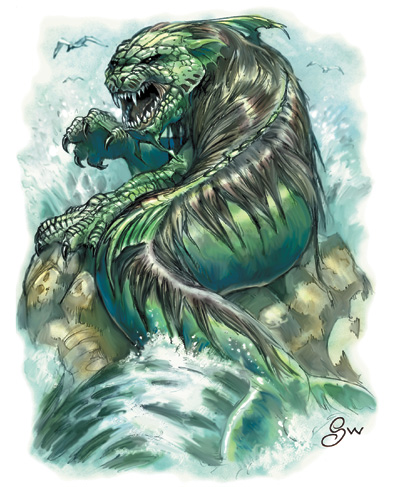 Large Magical Beast Hit
Dice: 6d10+18 (51 hp) Initiative:
+1 Speed: 10 ft. (2 squares),
swim
40 ft. Armor Class: 18 (–1
size, +1 Dex,
+8 natural), touch 10, flat-footed 17 Base
Attack/Grapple: +6/+14 Attack:
Claw +9 melee (1d6+4) Full Attack:
2 claws +9 melee
(1d6+4) and bite +4 melee (1d8+2) Space/Reach:
10 ft./5 ft. Special Attacks:
Rend 2d6+6 Special Qualities:
Darkvision 60
ft., hold breath, low-light vision, scent Saves: Fort +8, Ref +6, Will +5 Abilities: Str 19, Dex 12, Con
17, Int 2, Wis 13, Cha 10 Skills:
Listen +8, Spot +7, Swim
+12 Feats: Alertness,
Endurance, Iron
Will Environment: Temperate
aquatic Organization: Solitary,
pair, or
pride (5–12) Challenge Rating: 4
Treasure: None Alignment: Always neutral Advancement: 7–9 HD (Large);
10–18 HD (Huge) Level Adjustment:
—
Large Magical Beast Hit
Dice: 6d10+18 (51 hp) Initiative:
+1 Speed: 10 ft. (2 squares),
swim
40 ft. Armor Class: 18 (–1
size, +1 Dex,
+8 natural), touch 10, flat-footed 17 Base
Attack/Grapple: +6/+14 Attack:
Claw +9 melee (1d6+4) Full Attack:
2 claws +9 melee
(1d6+4) and bite +4 melee (1d8+2) Space/Reach:
10 ft./5 ft. Special Attacks:
Rend 2d6+6 Special Qualities:
Darkvision 60
ft., hold breath, low-light vision, scent Saves: Fort +8, Ref +6, Will +5 Abilities: Str 19, Dex 12, Con
17, Int 2, Wis 13, Cha 10 Skills:
Listen +8, Spot +7, Swim
+12 Feats: Alertness,
Endurance, Iron
Will Environment: Temperate
aquatic Organization: Solitary,
pair, or
pride (5–12) Challenge Rating: 4
Treasure: None Alignment: Always neutral Advancement: 7–9 HD (Large);
10–18 HD (Huge) Level Adjustment:
—
A typical sea cat is 12 feet long and weighs 800 pounds.
COMBAT
Sea cats attack on sight, either for food or to defend their territory, and use both claws and teeth to grab and rend their prey. They display tremendous courage, always fighting to the death, even against creatures many times their size. Pairs and prides of sea cats attack in concert, trying to wear the opponent down until one beast can dispatch it.
Hold Breath (Ex): A sea cat can hold its breath for a number of rounds equal to 6 x its Constitution score before it risks drowning.
Rend (Ex): A sea cat that hits with both claw attacks latches onto the opponent’s body and tears the flesh. This automatically deals an extra 2d6+6 points of damage.
Skills: A sea cat has a +8 racial bonus on any Swim check to perform some special action or avoid a hazard. It can always choose to take 10 on a Swim check, even if distracted or endangered. It can use the run action while swimming, provided it swims in a straight line.
SHADOW
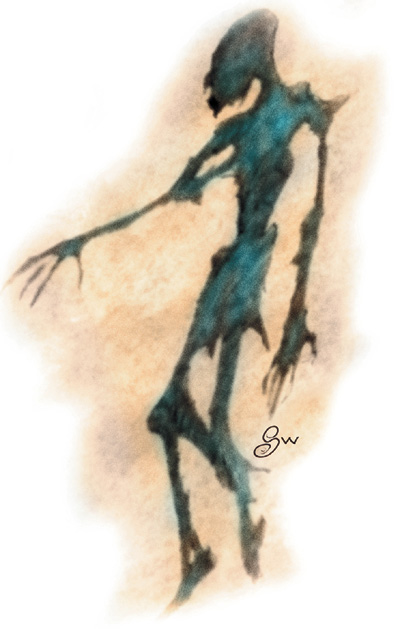 Medium Undead (Incorporeal) Hit Dice: 3d12 (19 hp) Initiative: +2 Speed: Fly 40 ft. (good) (8
squares) Armor Class: 13 (+2
Dex, +1
deflection), touch 13, flat-footed 11 Base
Attack/Grapple: +1/— Attack:
Incorporeal touch +3
melee (1d6 Str) Full Attack:
Incorporeal touch +3
melee (1d6 Str) Space/Reach: 5
ft./5 ft. Special Attacks:
Create spawn,
strength damage Special Qualities:
Darkvision 60
ft., incorporeal traits, +2 turn resistance, undead traits Saves: Fort +1, Ref +3, Will +4 Abilities: Str —, Dex 14, Con
—,Int 6, Wis 12, Cha 13 Skills:
Hide +8*, Listen +7,
Search +4, Spot +7 Feats:
Alertness, Dodge Environment:
Any Organization: Solitary,
gang
(2–5), or swarm (6–11) Challenge
Rating: 3 Treasure: None
Alignment: Always chaotic evil
Advancement: 4–9 HD (Medium)
Level Adjustment: —
Medium Undead (Incorporeal) Hit Dice: 3d12 (19 hp) Initiative: +2 Speed: Fly 40 ft. (good) (8
squares) Armor Class: 13 (+2
Dex, +1
deflection), touch 13, flat-footed 11 Base
Attack/Grapple: +1/— Attack:
Incorporeal touch +3
melee (1d6 Str) Full Attack:
Incorporeal touch +3
melee (1d6 Str) Space/Reach: 5
ft./5 ft. Special Attacks:
Create spawn,
strength damage Special Qualities:
Darkvision 60
ft., incorporeal traits, +2 turn resistance, undead traits Saves: Fort +1, Ref +3, Will +4 Abilities: Str —, Dex 14, Con
—,Int 6, Wis 12, Cha 13 Skills:
Hide +8*, Listen +7,
Search +4, Spot +7 Feats:
Alertness, Dodge Environment:
Any Organization: Solitary,
gang
(2–5), or swarm (6–11) Challenge
Rating: 3 Treasure: None
Alignment: Always chaotic evil
Advancement: 4–9 HD (Medium)
Level Adjustment: —
A shadow can be difficult to see in dark or gloomy areas but stands out starkly in brightly illuminated places.
A shadow is 5 to 6 feet tall and is weightless.
Shadows cannot speak intelligibly.
COMBAT
Shadows lurk in dark places, waiting for living prey to happen by.
Strength Damage (Su): The touch of a shadow deals 1d6 points of Strength damage to a living foe. A creature reduced to Strength 0 by a shadow dies. This is a negative energy effect.
Create Spawn (Su): Any humanoid reduced to Strength 0 by a shadow becomes a shadow under the control of its killer within 1d4 rounds.
Skills: Shadows have a +2 racial bonus on Listen and Spot checks and a +4 racial bonus on Search checks.
*A shadow gains a +4 racial bonus on Hide checks in areas of shadowy illumination. In brightly lit areas, it takes a –4 penalty on Hide checks.
SHADOW MASTIFF
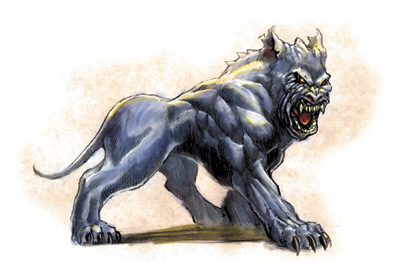 Medium Outsider (Extraplanar) Hit Dice: 4d8+12 (30 hp) Initiative: +5 Speed: 50 ft. (10 squares) Armor Class: 14 (+1 Dex, +3
natural), touch 11, flat-footed 13 Base
Attack/Grapple: +4/+7 Attack:
Bite +7 melee (1d6+4) Full Attack:
Bite +7 melee (1d6+4) Space/Reach:
5 ft./5 ft. Special Attacks:
Bay, trip Special Qualities:
Darkvision 60
ft., shadow blend, scent Saves:
Fort +7, Ref +5, Will +5 Abilities:
Str 17, Dex 13, Con
17, Int 4, Wis 12, Cha 13 Skills:
Hide +8, Listen +8, Move
Silently +8, Spot +8, Survival +8* Feats:
Dodge, Improved
Initiative, TrackB Environment:
Plane of Shadow Organization:
Solitary, pair, or
pack (5–12) Challenge Rating: 5
Treasure: None Alignment: Always neutral evil Advancement: 5–6 HD (Medium);
7–12 HD (Large) Level Adjustment:
+3 (cohort)
Medium Outsider (Extraplanar) Hit Dice: 4d8+12 (30 hp) Initiative: +5 Speed: 50 ft. (10 squares) Armor Class: 14 (+1 Dex, +3
natural), touch 11, flat-footed 13 Base
Attack/Grapple: +4/+7 Attack:
Bite +7 melee (1d6+4) Full Attack:
Bite +7 melee (1d6+4) Space/Reach:
5 ft./5 ft. Special Attacks:
Bay, trip Special Qualities:
Darkvision 60
ft., shadow blend, scent Saves:
Fort +7, Ref +5, Will +5 Abilities:
Str 17, Dex 13, Con
17, Int 4, Wis 12, Cha 13 Skills:
Hide +8, Listen +8, Move
Silently +8, Spot +8, Survival +8* Feats:
Dodge, Improved
Initiative, TrackB Environment:
Plane of Shadow Organization:
Solitary, pair, or
pack (5–12) Challenge Rating: 5
Treasure: None Alignment: Always neutral evil Advancement: 5–6 HD (Medium);
7–12 HD (Large) Level Adjustment:
+3 (cohort)
This creature has the body of a large dog, with a smooth black coat and a mouth full of sharp teeth.
A shadow mastiff is slightly more than 2 feet high at the shoulder and weighs about 200 pounds.
Shadow mastiffs cannot speak, but they understand Common.
COMBAT
Shadow mastiffs prefer fighting in shadows or dark conditions, which gives them a great advantage. If a magical light source negates the shadows around them, shadow mastiffs are cunning enough to either move out of the light or back off and break up the opposition with their baying. They have been known to seize and carry off items enspelled with daylight spells.
Bay (Su): When a shadow mastiff howls or barks, all creatures except evil outsiders within a 300-foot spread must succeed on a DC 13 Will save or become panicked for 2d4 rounds. This is a sonic mind-affecting fear effect. Whether or not the save is successful, an affected creature is immune to the same mastiff ’s bay for 24 hours. The save DC is Charisma-based.
Trip (Ex): A shadow mastiff that hits with its bite attack can attempt to trip the opponent as a free action (+3 check modifier) without making a touch attack or provoking an attack of opportunity. If the attempt fails, the opponent cannot react to trip the shadow mastiff.
Shadow Blend (Su): In any condition of illumination other than full daylight, a shadow mastiff can disappear into the shadows, giving it total concealment. Artificial illumination, even a light or continual flame spell, does not negate this ability. A daylight spell, however, will.
Skills: *A shadow mastiff has a +4 racial bonus on Survival checks when tracking by scent.
SHAMBLING MOUND
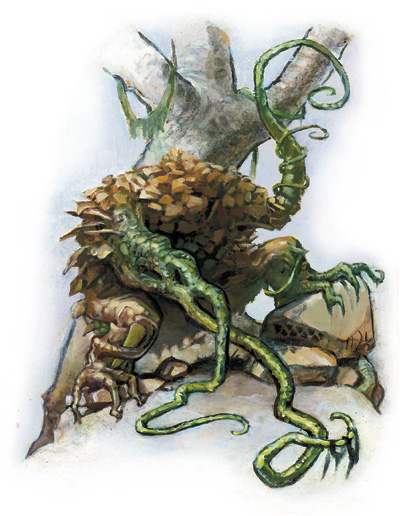 Large Plant Hit
Dice: 8d8+24 (60 hp) Initiative:
+0 Speed: 20 ft. (4 squares),
swim
20 ft. Armor Class: 20 (–1
size, +11
natural), touch 9, flat-footed 20 Base
Attack/Grapple: +6/+15 Attack:
Slam +11 melee (2d6+5) Full Attack:
2 slams +11 melee
(2d6+5) Space/Reach: 10 ft./10
ft. Special Attacks: Improved
grab,
constrict 2d6+7 Special Qualities:
Darkvision 60
ft., immunity to electricity, low-light vision, plant traits,
resistance to fire 10 Saves:
Fort +9, Ref +2, Will +4 Abilities:
Str 21, Dex 10, Con
17, Int 7, Wis 10, Cha 9 Skills:
Hide +3*, Listen +8, Move
Silently +8 Feats: Iron Will,
Power Attack,
Weapon Focus (slam) Environment:
Temperate marshes Organization:
Solitary Challenge Rating: 6
Treasure: 1/10th coins; 50%
goods; 50% items Alignment:
Usually neutral Advancement:
9–12 HD (Large);
13–24 HD (Huge) Level Adjustment:
+6
Large Plant Hit
Dice: 8d8+24 (60 hp) Initiative:
+0 Speed: 20 ft. (4 squares),
swim
20 ft. Armor Class: 20 (–1
size, +11
natural), touch 9, flat-footed 20 Base
Attack/Grapple: +6/+15 Attack:
Slam +11 melee (2d6+5) Full Attack:
2 slams +11 melee
(2d6+5) Space/Reach: 10 ft./10
ft. Special Attacks: Improved
grab,
constrict 2d6+7 Special Qualities:
Darkvision 60
ft., immunity to electricity, low-light vision, plant traits,
resistance to fire 10 Saves:
Fort +9, Ref +2, Will +4 Abilities:
Str 21, Dex 10, Con
17, Int 7, Wis 10, Cha 9 Skills:
Hide +3*, Listen +8, Move
Silently +8 Feats: Iron Will,
Power Attack,
Weapon Focus (slam) Environment:
Temperate marshes Organization:
Solitary Challenge Rating: 6
Treasure: 1/10th coins; 50%
goods; 50% items Alignment:
Usually neutral Advancement:
9–12 HD (Large);
13–24 HD (Huge) Level Adjustment:
+6
Shambling mounds, also called shamblers, appear to be heaps of rotting vegetation. They are actually intelligent, carnivorous plants.
A shambler’s brain and sensory organs are located in its upper body.
A shambler’s body has an 8-foot girth and is about 6 feet tall when the creature stands erect. It weighs about 3,800 pounds.
COMBAT
A shambling mound batters or constricts its opponents with two huge, armlike appendages.
Improved Grab (Ex): To use this ability, a shambler must hit with both slam attacks. It can then attempt to start a grapple as a free action without provoking an attack of opportunity. If it wins the grapple check, it establishes a hold and can constrict.
Constrict (Ex): A shambler deals 2d6+7 points of damage with a successful grapple check.
Immunity to Electricity (Ex): Shamblers take no damage from electricity. Instead, any electricity attack used against a shambler temporarily grants it 1d4 points of Constitution. The shambler loses these points at the rate of 1 per hour.
Skills: Shamblers have a +4 racial bonus on Hide, Listen, and Move Silently checks. *They have a +12 racial bonus on Hide checks when in a swampy or forested area.
SHIELD GUARDIAN
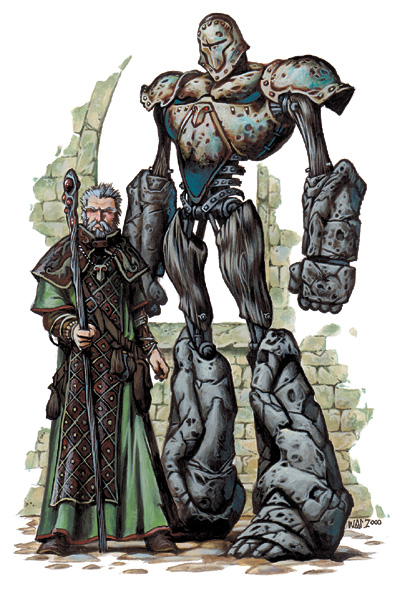 Large Construct Hit
Dice: 15d10+30 (112 hp) Initiative:
+0 Speed: 30 ft. (6 squares)
Armor Class: 24 (–1 size, +15
natural), touch 9, flat-footed 24 Base
Attack/Grapple: +11/+21 Attack:
Slam +16 melee (1d8+6) Full Attack:
2 slams +16 melee
(1d8+6) Space/Reach: 10 ft./10
ft. Special Attacks: — Special Qualities: Construct
traits, darkvision 60 ft., fast healing 5, find master, guard,
low-light vision, shield other, spell storing Saves: Fort +5, Ref +5, Will +5 Abilities: Str 22, Dex 10, Con —,
Int —, Wis 10, Cha 1 Environment:
Any Organization: Solitary
Challenge Rating: 8 Treasure: None Alignment: Always neutral Advancement: 16–24 HD (Large);
25–45 HD (Huge) Level Adjustment:
—
Large Construct Hit
Dice: 15d10+30 (112 hp) Initiative:
+0 Speed: 30 ft. (6 squares)
Armor Class: 24 (–1 size, +15
natural), touch 9, flat-footed 24 Base
Attack/Grapple: +11/+21 Attack:
Slam +16 melee (1d8+6) Full Attack:
2 slams +16 melee
(1d8+6) Space/Reach: 10 ft./10
ft. Special Attacks: — Special Qualities: Construct
traits, darkvision 60 ft., fast healing 5, find master, guard,
low-light vision, shield other, spell storing Saves: Fort +5, Ref +5, Will +5 Abilities: Str 22, Dex 10, Con —,
Int —, Wis 10, Cha 1 Environment:
Any Organization: Solitary
Challenge Rating: 8 Treasure: None Alignment: Always neutral Advancement: 16–24 HD (Large);
25–45 HD (Huge) Level Adjustment:
—
Created by spellcasters to be bodyguards, shield guardians are constructs that protect their masters with spells and stamina. When it is fashioned, a shield guardian is keyed to a particular magical amulet. Henceforth, it regards the wearer of that amulet to be its master, protecting and following that individual everywhere (unless specifically commanded not to do so).
A shield guardian obeys its master’s verbal commands to the best of its ability, although it is not good for much beyond combat and possibly simple manual labor. It can also be keyed to perform specific tasks at specific times or when certain conditions are met. The wearer of the amulet can call the shield guardian from any distance, and it will come as long as it is on the same plane.
A shield guardian is some 9 feet tall and weighs more than 1,200 pounds.
Shield guardians cannot speak, but they understand commands given in any language.
COMBAT
Shield guardians are straightforward in battle, bashing with their heavy stone fists. They are made for defense and are not particularly impressive on offense.
Find Master (Su): As long as a shield guardian and its amulet are on the same plane, the shield guardian can find the amulet wearer (or just the amulet, if it is removed after the guardian is called).
Guard (Ex): If ordered to do so, a shield guardian moves swiftly to defend the wearer of its amulet, blocking blows and disrupting foes. All attacks against the amulet wearer take a –2 penalty when the shield guardian is adjacent to its master.
Shield Other (Sp): The wearer of a shield guardian’s amulet can activate this defensive ability if within 100 feet of the shield guardian. Just as the spell of the same name, this ability transfers to the shield guardian half the damage that would be dealt to the amulet wearer (this ability does not provide the spell’s AC or save bonuses).
Spell Storing (Sp): A shield guardian can store one spell of 4th level or lower that is cast into it by another creature. It “casts” this spell when commanded to do so or when a predefined situation arises. Once this spell is used, the shield guardian can store another spell (or the same spell again).
CONSTRUCTION
A shield guardian is built from wood, bronze, stone, and steel. The materials cost 5,000 gp. The creature’s master may assemble the body or hire someone else to do the job. Creating the body requires a DC 16 Craft (blacksmithing) or Craft (carpentry) check. The keyed amulet is fashioned at the same time, and its cost (20,000 gp) is included in the cost of the guardian. After the body is sculpted, the shield guardian is animated through an extended magical ritual that requires a specially prepared laboratory or workroom, similar to an alchemist’s laboratory and costing 500 gp to establish. If the creator is personally constructing the creature’s body, the building and the ritual can be performed together.
A shield guardian with more than 15 Hit Dice can be created, but each additional Hit Die adds +5,000 gp to the market price, and the price increases by +20,000 gp if the creature’s size increases to Huge, modifying the cost to create accordingly.
CL 15th; Craft Construct, limited wish, discern location, shield, shield other, caster must be at least 15th level; Price 120,000 gp; Cost 65,000 gp + 4,600 XP.
AMULET
If a shield guardian’s amulet is destroyed, the guardian ceases to function until a new one is created. If the wearer dies but the amulet is intact, the shield guardian carries out the last command it was given.
SHOCKER LIZARD
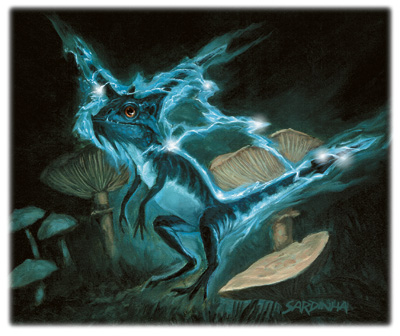 Small Magical Beast Hit
Dice: 2d10+2 (13 hp) Initiative:
+6 Speed: 40 ft. (8 squares),
climb
20 ft., swim 20 ft. Armor Class:
16 (+1 size, +2 Dex,
+3 natural), touch 13, flat-footed 14 Base
Attack/Grapple: +2/–2 Attack:
Bite +3 melee (1d4) Full Attack:
Bite +3 melee (1d4) Space/Reach:
5 ft./5 ft. Special Attacks:
Stunning shock,
lethal shock Special Qualities:
Darkvision 60
ft., electricity sense, immunity to electricity, low-light vision
Saves: Fort +4, Ref +5, Will +1
Abilities: Str 10, Dex 15, Con
13, Int 2, Wis 12, Cha 6 Skills:
Climb
+11, Hide +11, Jump
+7, Listen +4, Spot +4, Swim +10 Feats:
Improved Initiative Environment:
Warm marshes Organization:
Solitary, pair,
clutch (3–5), or colony (6–11) Challenge
Rating: 2 Treasure: 1/10
coins; 50% goods;
50% items Alignment: Always
neutral Advancement: 3–4 HD
(Small); 5–6
HD (Medium) Level Adjustment: —
Small Magical Beast Hit
Dice: 2d10+2 (13 hp) Initiative:
+6 Speed: 40 ft. (8 squares),
climb
20 ft., swim 20 ft. Armor Class:
16 (+1 size, +2 Dex,
+3 natural), touch 13, flat-footed 14 Base
Attack/Grapple: +2/–2 Attack:
Bite +3 melee (1d4) Full Attack:
Bite +3 melee (1d4) Space/Reach:
5 ft./5 ft. Special Attacks:
Stunning shock,
lethal shock Special Qualities:
Darkvision 60
ft., electricity sense, immunity to electricity, low-light vision
Saves: Fort +4, Ref +5, Will +1
Abilities: Str 10, Dex 15, Con
13, Int 2, Wis 12, Cha 6 Skills:
Climb
+11, Hide +11, Jump
+7, Listen +4, Spot +4, Swim +10 Feats:
Improved Initiative Environment:
Warm marshes Organization:
Solitary, pair,
clutch (3–5), or colony (6–11) Challenge
Rating: 2 Treasure: 1/10
coins; 50% goods;
50% items Alignment: Always
neutral Advancement: 3–4 HD
(Small); 5–6
HD (Medium) Level Adjustment: —
A shocker lizard has a pale gray or blue underside, shading to a darker hue on its back. It has blue-black markings along its back and tail.
A shocker lizard is about 1 foot tall at the shoulder and weighs about 25 pounds.
COMBAT
A shocker lizard relies on its electricity abilities in combat. A lizard tends to bite only after its shock has rendered an opponent unconscious or when the shock seems to have no effect at all. A solitary lizard flees once it delivers its shocks, but if other shocker lizards are nearby, they all home in on their comrade’s discharges and attempt to administer their shocks to the foe.
Stunning Shock (Su): Once per round, a shocker lizard can deliver an electrical shock to a single opponent within 5 feet. This attack deals 2d8 points of nonlethal damage to living opponents (Reflex DC 12 half ). The save DC is Constitution-based.
Lethal Shock (Su): Whenever two or more shocker lizards are within 20 feet of each other, they can work together to create a lethal shock. This effect has a radius of 20 feet, centered on any one contributing lizard. The shock deals 2d8 points of electricity damage for each lizard contributing to it, to a maximum of 12d8. A Reflex save (DC 10 + number of lizards contributing) reduces the damage by half.
Electricity Sense (Ex): Shocker lizards automatically detect any electrical discharges within 100 feet.
Skills: Shocker lizards have a +4 racial bonus on Hide checks due to their coloration. Shocker lizards have a +2 racial bonus on Listen and Spot checks.
Shocker lizards use their Dexterity modifier instead of their Strength modifier for Climb and Jump checks.
A shocker lizard has a +8 racial bonus on Climb checks and can always choose to take 10 on a Climb check, even if rushed or threatened.
A shocker lizard has a +8 racial bonus on any Swim check to perform some special action or avoid a hazard. It can always choose to take 10 on a Swim check, even if distracted or endangered. It can use the run action while swimming, provided it swims in a straight line.
SKELETON
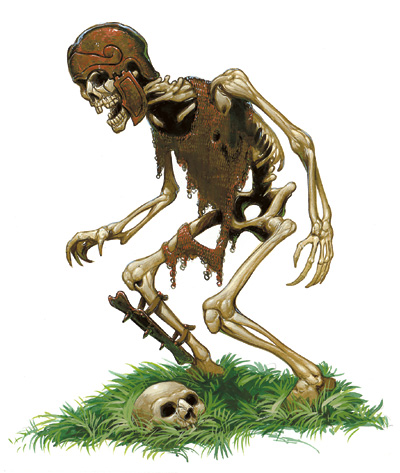
Skeletons are the animated bones of the dead, mindless automatons that obey the orders of their evil masters.
A skeleton is seldom garbed in anything more than the rotting remnants of any clothing or armor it was wearing when slain. A skeleton does only what it is ordered to do. It can draw no conclusions of its own and takes no initiative. Because of this limitation, its instructions must always be simple. A skeleton attacks until destroyed.
CREATING A SKELETON
“Skeleton” is an acquired template that can be added to any corporeal creature (other than an undead) that has a skeletal system (referred to hereafter as the base creature).
Size and Type: The creature’s type changes to undead. It retains any subtype except for alignment subtypes (such as good) and subtypes that indicate kind. It does not gain the augmented subtype. It uses all the base creature’s statistics and special abilities except as noted here.
Hit Dice: Drop any Hit Dice gained from class levels (to a minimum of 1) and raise remaining Hit Dice to d12s. If the creature has more than 20 Hit Dice, it can’t be made into a skeleton by the animate dead spell.
Speed: Winged skeletons can’t use their wings to fly. If the base creature flew magically, so can the skeleton.
Armor Class: Natural armor bonus changes to a number based on the skeleton’s size:
| Size | Bonus |
|---|---|
| Tiny or smaller | +0 |
| Small | +1 |
| Medium or Large | +2 |
| Huge | +3 |
| Gargantuan | +6 |
| Colossal | +10 |
Attacks: A skeleton retains all the natural weapons, manufactured weapon attacks, and weapon proficiencies of the base creature, except for attacks that can’t work without flesh. A creature with hands gains one claw attack per hand; the skeleton can strike with each of its claw attacks at its full attack bonus. A skeleton’s base attack bonus is equal to 1/2 its Hit Dice.
Damage: Natural and manufactured weapons deal damage normally. A claw attack deals damage depending on the skeleton’s size. (If the base creature already had claw attacks with its hands, use the skeleton claw damage only if it’s better.)
| Size | Damage |
|---|---|
| Diminutive or Fine | 1 |
| Tiny | 1d2 |
| Small | 1d3 |
| Medium | 1d4 |
| Large | 1d6 |
| Huge | 1d8 |
| Gargantuan | 2d6 |
| Colossal | 2d8 |
Special Attacks: A skeleton retains none of the base creature’s special attacks.
Special Qualities: A skeleton loses most special qualities of the base creature. It retains any extraordinary special qualities that improve its melee or ranged attacks. A skeleton gains the following special qualities.
Immunity to Cold (Ex): Skeletons are not affected by cold.
Damage Reduction 5/Bludgeoning: Skeletons lack flesh or internal organs.
Saves: Base save bonuses are Fort +1/3 HD, Ref +1/3 HD, and Will +1/2 HD + 2.
Abilities: A skeleton’s Dexterity increases by +2, it has no Constitution or Intelligence score, its Wisdom changes to 10, and its Charisma changes to 1.
Skills: A skeleton has no skills.
Feats: A skeleton loses all feats of the base creature and gains Improved Initiative.
Environment: Any, usually same as base creature.
Organization: Any.
Challenge Rating: Depends on Hit Dice, as follows:
| Hit Dice | Challenge Rating |
|---|---|
| 1/2 | 1/6 |
| 1 | 1/3 |
| 2–3 | 1 |
| 4–5 | 2 |
| 6–7 | 3 |
| 8–9 | 4 |
| 10–11 | 5 |
| 12–14 | 6 |
| 15–17 | 7 |
| 18–20 | 8 |
Treasure: None.
Alignment: Always neutral evil.
Advancement: As base creature (or — if the base creature advances by character class).
Level Adjustment: —.
| Human Warrior Skeleton Medium Undead |
Wolf Skeleton Medium Undead |
Owlbear Skeleton Large Undead |
|||
|---|---|---|---|---|---|
| Hit Dice: | 1d12 (6 hp) | 2d12 (13 hp) | 5d12 (32 hp) | ||
| Initiative: | +5 | +7 | +6 | ||
| Speed: | 30 ft. (6 squares) | 50 ft. (10 squares) | 30 ft. (6 squares) | ||
| Armor Class: | 15 (+1 Dex, +2 natural, +2 heavy steel shield), touch 11, flat-footed 14 | 15 (+3 Dex, +2 natural), touch 13, flat-footed 12 | 13 (–1 size, +2 Dex, +2 natural), touch 11, flat-footed 11 | ||
| Base Attack/Grapple: | +0/+1 | +1/+2 | +2/+11 | ||
| Attack: | Scimitar +1 melee (1d6+1/18–20) or claw +1 melee (1d4+1) | Bite +2 melee (1d6+1) | Claw +6 melee (1d6+5) | ||
| Full Attack: | Scimitar +1 melee (1d6+1/18–20) or 2 claws +1 melee (1d4+1) | Bite +2 melee (1d6+1) | 2 claws +6 melee (1d6+5) and bite +1 melee (1d8+2) | ||
| Space/Reach: | 5 ft./5 ft. | 5 ft./5 ft. | 10 ft./5 ft. | ||
| Special Attacks: — | — | — | |||
| Special Qualities: | Damage reduction 5/bludgeoning, darkvision 60 ft., immunity to cold, undead traits | Damage reduction 5/bludgeoning, darkvision 60 ft., immunity to cold, undead traits | Damage reduction 5/bludgeoning, darkvision 60 ft., immunity to cold, undead traits | ||
| Saves: | Fort +0, Ref +1, Will +2 | Fort +0, Ref +3, Will +3 | Fort +1, Ref +3, Will +4 | ||
| Abilities: | Str 13, Dex 13, Con —, Int —, Wis 10, Cha 1 | Str 13, Dex 17, Con —, Int —, Wis 10, Cha 1 | Str 21, Dex 14, Con —, Int —, Wis 10, Cha 1 | ||
| Feats: | Improved Initiative | Improved Initiative | Improved Initiative | ||
| Environment: | Temperate plains | Temperate forests | Temperate forests | ||
| Organization: | Any | Any | Any | ||
| Challenge Rating: | 1/3 | 1 | 2 | ||
| Treasure: | None | None | None | ||
| Alignment: | Always neutral evil | Always neutral evil | Always neutral evil | ||
| Advancement: | — | 3 HD (Medium); 4–6 HD (Large) | 6–8 HD (Large); 9–15 HD (Huge) | ||
| Level Adjustment: | — | — | — |
| Troll Skeleton Large Undead |
Chimera Skeleton Large Undead |
Ettin Skeleton Large Undead |
|||
|---|---|---|---|---|---|
| Hit Dice: | 6d12 (39 hp) | 9d12 (58 hp) | 10d12 (65 hp) | ||
| Initiative: | +7 | +6 | +4 | ||
| Speed: | 30 ft. (6 squares) | 30 ft. (6 squares) | 40 ft. (8 squares) | ||
| Armor Class: | 14 (+3 Dex, –1 size, +2 natural), touch 12, flat-footed 11 | 13 (+2 Dex., –1 size, +2 natural), touch 11, flat-footed 11 | 11 (–1 size, +2 natural), touch 9, flat-footed 11 | ||
| Base Attack/Grapple: | +3/+13 | +4/+12 | +5/+15 | ||
| Attack: | Claw +8 melee (1d6+6) | Bite +7 melee (2d6+4) | Morningstar +10 melee (2d6+6) or claw +10 melee (1d6+6) or javelin +4 ranged (1d8+6) | ||
| Full Attack: | 2 claws +8 melee (1d6+6) and bite +3 melee (1d6+3) | Bite +7 melee (2d6+4) and bite+7 melee (1d8+4) and gore +7 melee (1d8+4) and 2 claws +2 melee (1d6+2) | 2 morningstars +10 melee (2d6+6) or 2 claws +10 melee (1d6+6) or 2 javelins +4 ranged (1d8+6) | ||
| Space/Reach: | 10 ft./10 ft | 10 ft./5 ft | 10 ft./10 ft. | ||
| Special Attacks: | — | — | — | ||
| Special Qualities: | Damage reduction 5/bludgeoning, darkvision 60 ft., immunity to cold, undead traits | Damage reduction 5/bludgeoning, darkvision 60 ft., immunity to cold, undead traits | Damage reduction 5/bludgeoning, darkvision 60 ft., darkvision 60 ft., immunity to cold, superior twoweapon | ||
| Saves: | Fort +2, Ref +5, Will +5 | Fort +3, Ref +5, Will +6 | Fort +3, Ref +3, Will +7 | ||
| Abilities: | Str 23, Dex 16, Con —, Int —, Wis 10, Cha 1 | Str 19, Dex 15, Con —, Int —, Wis 10, Cha 1 | Str 23, Dex 10, Con —, Int —, Wis 10, Cha 1 | ||
| Feats: | Improved Initiative | Improved Initiative | Improved Initiative | ||
| Environment: | Cold mountains | Temperate hills | Cold hills | ||
| Organization: | Any | Any | Any | ||
| Challenge Rating: | 3 | 4 | 5 | ||
| Treasure: | None | None | None | ||
| Alignment: | Always neutral evil | Always neutral evil | Always neutral evil | ||
| Advancement: | — | 10–13 HD (Large); 14–27 HD (Huge) | — | ||
| Level Adjustment: | — | — | — |
| Advanced Megaraptor Skeleton Huge Undead |
Cloud Giant Skeleton Huge Undead |
Young Adult Red Dragon Skeleton Huge Undead (Fire) |
|||
|---|---|---|---|---|---|
| Hit Dice: | 12d12 (78 hp) | 17d12 (110 hp) | 19d12 (123 hp) | ||
| Initiative: | +7 | +6 | +5 | ||
| Speed: | 60 ft. (12 squares) | 50 ft. (10 squares) | 40 ft. (8 squares) | ||
| Armor Class: | 14 (–2 size, +3 Dex, +3 natural), touch 11, flat-footed 11 | 13 (–2 size, +2 Dex, +3 natural), touch 10, flat-footed 11 | 12 (–2 size, +1 Dex, +3 natural), touch 9, flat-footed 11 | ||
| Base Attack/Grapple: | +6/+19 | +8/+28 | +9/+27 | ||
| Attack: | Talons +9 melee (2d8+5) | Gargantuan morningstar +18 melee (4d6+18) or claw +18 melee (1d8+12) or rock +8 ranged (2d8+12) | Bite +17 melee (2d8+10) | ||
| Full Attack: | Talons +9 melee (2d8+5) and 2 claws +4 melee (1d8+2) and bite +4 melee (2d6+2) | Gargantuan morningstar +18/+13 melee (4d6+18) or 2 claws +18 melee (1d8+12) or rock +8 ranged (2d8+12) | Bite +17 melee (2d8+10) and 2 claws +12 melee (2d6+5) and 2 wings +12 melee (1d8+5) and tail slap +12 melee (2d6+15) | ||
| Space/Reach: | 15 ft./10 ft. | 15 ft./15 ft. | 15 ft./10 ft. | ||
| Special Attacks: | — | — | — | ||
| Special Qualities: | Damage reduction 5/bludgeoning, darkvision 60 ft., immunity to cold, undead traits | Damage reduction 5/bludgeoning, darkvision 60 ft., immunity to cold, oversize weapon, undead traits | Damage reduction 5/bludgeoning, darkvision 60 ft., immunity to cold and fire, undead traits | ||
| Saves: | Fort +4, Ref +7, Will +8 | Fort +5, Ref +7, Will +10 | Fort +6, Ref +7, Will +8 | ||
| Abilities: | Str 21, Dex 17, Con —, Int —, Wis 10, Cha 1 | Str 35, Dex 15, Con —, Int —, Wis 10, Cha 1 | Str 31, Dex 12, Con —, Int —, Wis 10, Cha 1 | ||
| Feats: | Improved Initiative | Improved Initiative | Improved Initiative | ||
| Environment: | Warm forests | Temperate mountains | Warm mountains | ||
| Organization: | Any | Any | Any | ||
| Challenge Rating: | 6 | 7 | 8 | ||
| Treasure: | None | None | None | ||
| Alignment: | Always neutral evil | Always neutral evil | Always neutral evil | ||
| Advancement: | 13–16 HD (Huge); 17–20 HD (Gargantuan) | — | 20 HD (Huge) | ||
| Level Adjustment: | — | — | — |
SKUM
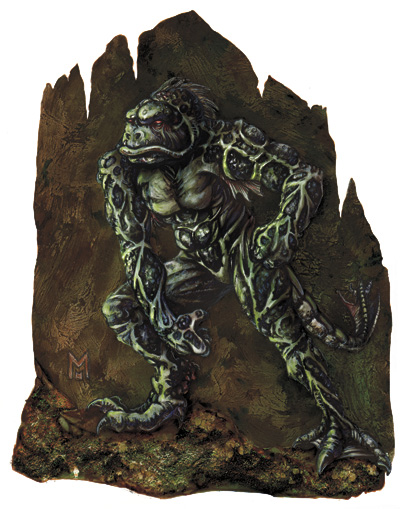 Medium Aberration (Aquatic) Hit Dice: 2d8+2 (11 hp) Initiative: +1 Speed: 20 ft. (4 squares), swim
40 ft. Armor Class: 13 (+1 Dex,
+2
natural), touch 11, flat-footed 12 Base
Attack/Grapple: +1/+5 Attack:
Bite +5 melee (2d6+4) Full Attack:
Bite +5 melee
(2d6+4) and 2 claws +0 melee (1d4+2) Space/Reach:
5 ft./5 ft. Special Attacks:
Rake 1d6+2 Special Qualities:
Darkvision 60
ft., amphibious Saves: Fort +1,
Ref +1, Will +3 Abilities: Str
19, Dex 13, Con
13, Int 10, Wis 10, Cha 6 Skills:
Hide +6*, Listen +7*,
Move Silently +6, Spot +7*, Swim +12 Feats:
Alertness Environment:
Underground Organization: Brood
(2–5) or pack
(6–15) Challenge Rating: 2
Treasure: None Alignment: Usually lawful evil Advancement: 3–4 HD (Medium); 5–6
HD (Large) Level Adjustment: +3
Medium Aberration (Aquatic) Hit Dice: 2d8+2 (11 hp) Initiative: +1 Speed: 20 ft. (4 squares), swim
40 ft. Armor Class: 13 (+1 Dex,
+2
natural), touch 11, flat-footed 12 Base
Attack/Grapple: +1/+5 Attack:
Bite +5 melee (2d6+4) Full Attack:
Bite +5 melee
(2d6+4) and 2 claws +0 melee (1d4+2) Space/Reach:
5 ft./5 ft. Special Attacks:
Rake 1d6+2 Special Qualities:
Darkvision 60
ft., amphibious Saves: Fort +1,
Ref +1, Will +3 Abilities: Str
19, Dex 13, Con
13, Int 10, Wis 10, Cha 6 Skills:
Hide +6*, Listen +7*,
Move Silently +6, Spot +7*, Swim +12 Feats:
Alertness Environment:
Underground Organization: Brood
(2–5) or pack
(6–15) Challenge Rating: 2
Treasure: None Alignment: Usually lawful evil Advancement: 3–4 HD (Medium); 5–6
HD (Large) Level Adjustment: +3
A skum is about the same height and weight as a human.
Skum speak Aquan.
COMBAT
Rake (Ex): Attack bonus +0 melee, damage 1d6+2. A skum also gains two rake attacks when it attacks while swimming.
Skills: *Skum have a +4 racial bonus on Hide, Listen, and Spot checks underwater.
A skum has a +8 racial bonus on any Swim check to perform some special action or avoid a hazard. It can always choose to take 10 on a Swim check, even if distracted or endangered. It can use the run action while swimming, provided it swims in a straight line.
SPECTRE
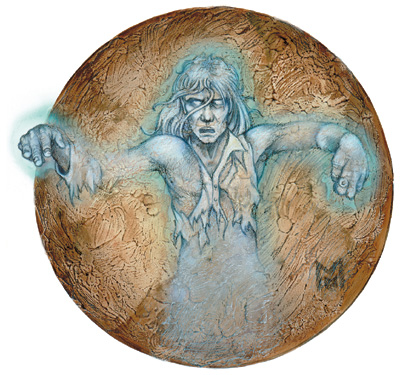 Medium Undead (Incorporeal) Hit Dice: 7d12 (45 hp) Initiative: +7 Speed: 40 ft. (8 squares), fly 80
ft. (perfect) Armor Class: 15
(+3 Dex, +2
deflection), touch 15, flat-footed 13 Base
Attack/Grapple: +3/— Attack:
Incorporeal touch +6
melee (1d8 plus energy drain) Full
Attack: Incorporeal touch +6
melee (1d8 plus energy drain) Space/Reach:
5 ft./5 ft. Special Attacks:
Energy drain,
create spawn Special Qualities:
Darkvision 60
ft., incorporeal traits, +2 turn resistance, sunlight powerlessness,
undead traits, unnatural aura Saves:
Fort +2, Ref +5, Will +7 Abilities:
Str —, Dex 16, Con —,
Int 14, Wis 14, Cha 15 Skills:
Hide +13, Intimidate +12,
Knowledge (religion) +12, Listen +14, Search +12, Spot +14, Survival +2
(+4 following tracks) Feats:
Alertness, Blind-Fight,
Improved Initiative Environment:
Any land and
underground Organization:
Solitary, gang
(2–4), or swarm (6–11) Challenge
Rating: 7 Treasure: None
Alignment: Always lawful evil
Advancement: 8–14 HD (Medium)
Level Adjustment: —
Medium Undead (Incorporeal) Hit Dice: 7d12 (45 hp) Initiative: +7 Speed: 40 ft. (8 squares), fly 80
ft. (perfect) Armor Class: 15
(+3 Dex, +2
deflection), touch 15, flat-footed 13 Base
Attack/Grapple: +3/— Attack:
Incorporeal touch +6
melee (1d8 plus energy drain) Full
Attack: Incorporeal touch +6
melee (1d8 plus energy drain) Space/Reach:
5 ft./5 ft. Special Attacks:
Energy drain,
create spawn Special Qualities:
Darkvision 60
ft., incorporeal traits, +2 turn resistance, sunlight powerlessness,
undead traits, unnatural aura Saves:
Fort +2, Ref +5, Will +7 Abilities:
Str —, Dex 16, Con —,
Int 14, Wis 14, Cha 15 Skills:
Hide +13, Intimidate +12,
Knowledge (religion) +12, Listen +14, Search +12, Spot +14, Survival +2
(+4 following tracks) Feats:
Alertness, Blind-Fight,
Improved Initiative Environment:
Any land and
underground Organization:
Solitary, gang
(2–4), or swarm (6–11) Challenge
Rating: 7 Treasure: None
Alignment: Always lawful evil
Advancement: 8–14 HD (Medium)
Level Adjustment: —
A spectre looks much as it did in life and can be easily recognized by those who knew the individual or have seen the individual’s face in a painting or a drawing. In many cases, the evidence of a violent death is visible on its body.
A spectre is roughly human-sized and is weightless.
COMBAT
In close combat a spectre attacks with its numbing, life-draining touch. It makes full use of its incorporeal nature, moving through walls, ceilings, and floors as it attacks.
Energy Drain (Su): Living creatures hit by a spectre’s incorporeal touch attack gain two negative levels. The DC is 15 for the Fortitude save to remove a negative level. The save DC is Charisma-based. For each such negative level bestowed, the spectre gains 5 temporary hit points.
Create Spawn (Su): Any humanoid slain by a spectre becomes a spectre in 1d4 rounds. Spawn are under the command of the spectre that created them and remain enslaved until its death. They do not possess any of the abilities they had in life.
Unnatural Aura (Su): Animals, whether wild or domesticated, can sense the unnatural presence of a spectre at a distance of 30 feet. They do not willingly approach nearer than that and panic if forced to do so; they remain panicked as long as they are within that range.
Sunlight Powerlessness (Ex): Spectres are powerless in natural sunlight (not merely a daylight spell) and flee from it. A spectre caught in sunlight cannot attack and can take only a single move or attack action in a round.
SPHINX
Sphinxes are enigmatic creatures with great, feathery wings and leonine bodies. All sphinxes are territorial, but the more intelligent ones can differentiate between deliberate intrusion and temporary or inadvertent trespass.
A typical sphinx is about 10 feet long and weighs about 800 pounds.
Sphinxes speak Sphinx, Common, and Draconic.
Combat
Most sphinxes fight on the ground, using their wings to help them pounce much as lions do. If outnumbered by earthbound creatures, a sphinx takes wing and attacks on the fly.
Pounce (Ex): If a sphinx charges a foe, it can make a full attack, including two rake attacks.
Rake (Ex): A sphinx that pounces onto a creature can make two rake attacks with its hind legs. Each sphinx’s description provides its attack bonus and damage.
ANDROSPHINX
Large Magical Beast Hit Dice: 12d10+48 (114 hp) Initiative: +0 Speed: 50 ft. (10 squares), fly 80 ft. (poor) Armor Class: 22 (–1 size, +13 natural), touch 9, flat-footed 22 Base Attack/Grapple: +12/+23 Attack: Claw +18 melee (2d4+7) Full Attack: 2 claws +18 melee (2d4+7) Space/Reach: 10 ft./5 ft. Special Attacks: Pounce, rake 2d4+3, roar, spells Special Qualities: Darkvision 60 ft., low-light vision Saves: Fort +12, Ref +8, Will +7 Abilities: Str 25, Dex 10, Con 19, Int 16, Wis 17, Cha 17 Skills: Intimidate +17, Knowledge (any one) +18, Listen +18, Spot +18, Survival +18 Feats: Alertness, Cleave, Great Cleave, Flyby Attack, Power Attack, Track Environment: Warm deserts Organization: Solitary Challenge Rating: 9 Treasure: Standard Alignment: Always chaotic good Advancement: 13–18 HD (Large); 19–36 HD (Huge) Level Adjustment: +5 (cohort)These sphinxes are always male. Androsphinxes are clever and generally good-natured, but they can be savage opponents.
Combat
In battle, an androsphinx rips apart enemies with its razor-sharp claws. It relies on its natural weapons in a fight, employing its spells for defense or healing.
Rake (Ex): Attack bonus +18 melee, damage 2d4+3.
Roar (Su): Three times per day an androsphinx can loose a mighty roar. The first time it does this, all creatures within 500 feet must succeed on a DC 19 Will save or be affected as though by a fear spell for 2d6 rounds.
If the sphinx roars a second time during the same encounter, all creatures within 250 feet must succeed on a DC 19 Fortitude save or be paralyzed for 1d4 rounds, and all those within 90 feet are deafened for 2d6 rounds (no save).
If it roars a third time during the same encounter, all those within 250 feet must succeed on a DC 19 Fortitude save or take 2d4 points of Strength damage for 2d4 rounds. In addition, any Medium or smaller creature within 90 feet must succeed on a DC 19 Fortitude save or be thrown to the ground and take 2d8 points of damage. The force of this roar is so great that it deals 50 points of damage to any stone or crystalline object within 90 feet. Magic items and held or carried items can avoid damage with a DC 19 Reflex save.
Other androsphinxes are immune to these effects. The save DCs are Charisma-based.
Spells: An androsphinx casts divine spells as a 6th-level cleric from the cleric spell list and from the Good, Healing, and Protection domains.
Typical Cleric Spells Prepared (5/5/5/4; save DC 13 + spell level): 0—cure minor wounds, detect magic, guidance, light, resistance; 1st—divine favor, protection from evil*, shield of faith, remove fear, summon monster I; 2nd—bull’s strength, remove paralysis, resist energy, shield other*, summon monster II; 3rd—cure serious wounds*, daylight, invisibility purge, searing light.
*Domain spell. Domains: Good and Healing.
CRIOSPHINX
Large Magical Beast Hit Dice: 10d10+30 (85 hp) Initiative: +0 Speed: 30 ft. (6 squares), fly 60 ft. (poor) Armor Class: 20 (–1 size, +11 natural), touch 9, flat-footed 20 Base Attack/Grapple: +10/+20 Attack: Gore +15 melee (2d6+6) Full Attack: Gore +15 melee (2d6+6) and 2 claws +10 melee (1d6+3) Space/Reach: 10 ft./5 ft. Special Attacks: Pounce, rake 1d6+3 Special Qualities: Darkvision 60 ft., low-light vision Saves: Fort +10, Ref +7, Will +3 Abilities: Str 23, Dex 10, Con 17, Int 10, Wis 11, Cha 11 Skills: Intimidate +8, Listen +11, Spot +1 Feats: Alertness, Cleave, Flyby Attack, Power Attack Environment: Warm deserts Organization: Solitary Challenge Rating: 7 Treasure: Standard Alignment: Always neutral Advancement: 11–15 HD (Large); 16–30 HD (Huge) Level Adjustment: +3 (cohort)These sphinxes are always male. Neither good nor evil, they lack the intelligence of the androsphinx.
Combat
Criosphinxes attack with their claws, as do their kin, but they can also butt with their horns. They don’t cast spells and employ only the most simple battle tactics.
Rake (Ex): Attack bonus +15 melee, damage 1d6+3.
GYNOSPHINX
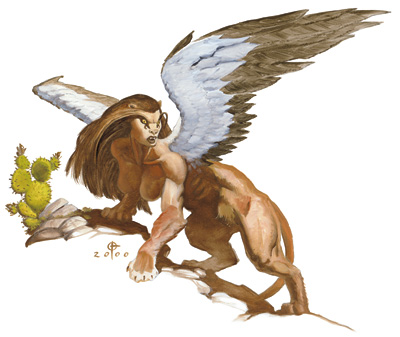 Large Magical Beast Hit
Dice: 8d10+8 (52 hp) Initiative:
+5 Speed: 40 ft. (8 squares),
fly 60
ft. (poor) Armor Class: 21 (–1
size, +1 Dex,
+11 natural), touch 10, flat-footed 20 Base
Attack/Grapple: +8/+16 Attack:
Claw +11 melee (1d6+4) Full Attack:
2 claws +11 melee
(1d6+4) Space/Reach: 10 ft./5
ft. Special Attacks: Pounce,
rake
1d6+2, spell-like abilities Special
Qualities: Darkvision 60
ft., low-light vision Saves:
Fort +7, Ref +7, Will +8 Abilities:
Str 19, Dex 12, Con
13, Int 18, Wis 19, Cha 19 Skills:
Bluff
+15, Concentration
+12, Diplomacy +8, Disguise +4 (+6 acting), Intimidate +13, Listen +17,
Sense Motive +15, Spot +17 Feats:
Combat Casting, Improved
Initiative, Iron Will Environment:
Warm deserts Organization:
Solitary or covey
(2–4) Challenge Rating: 8
Treasure: Double standard Alignment: Always neutral Advancement: 9–12 HD (Large);
13–24 HD (Huge) Level Adjustment:
+4 (cohort)
Large Magical Beast Hit
Dice: 8d10+8 (52 hp) Initiative:
+5 Speed: 40 ft. (8 squares),
fly 60
ft. (poor) Armor Class: 21 (–1
size, +1 Dex,
+11 natural), touch 10, flat-footed 20 Base
Attack/Grapple: +8/+16 Attack:
Claw +11 melee (1d6+4) Full Attack:
2 claws +11 melee
(1d6+4) Space/Reach: 10 ft./5
ft. Special Attacks: Pounce,
rake
1d6+2, spell-like abilities Special
Qualities: Darkvision 60
ft., low-light vision Saves:
Fort +7, Ref +7, Will +8 Abilities:
Str 19, Dex 12, Con
13, Int 18, Wis 19, Cha 19 Skills:
Bluff
+15, Concentration
+12, Diplomacy +8, Disguise +4 (+6 acting), Intimidate +13, Listen +17,
Sense Motive +15, Spot +17 Feats:
Combat Casting, Improved
Initiative, Iron Will Environment:
Warm deserts Organization:
Solitary or covey
(2–4) Challenge Rating: 8
Treasure: Double standard Alignment: Always neutral Advancement: 9–12 HD (Large);
13–24 HD (Huge) Level Adjustment:
+4 (cohort)
These sphinxes are the female counterparts of androsphinxes.
Combat
In close combat, gynosphinxes use their powerful claws to flay the flesh from their enemies. Despite their deadly nature, they prefer to avoid combat whenever possible.
Rake (Ex): Attack bonus +11 melee, damage 1d6+2.
Spell-Like Abilities: 3/day—clairaudience/clairvoyance, detect magic, read magic, see invisibility; 1/day—comprehend languages, locate object, dispel magic, remove curse (DC 18), legend lore. Caster level 14th. The save DC is Charisma-based.
Once per week a gynosphinx can create a symbol of death, a symbol of fear, a symbol of insanity, a symbol of pain, a symbol of persuasion, a symbol of sleep, and a symbol of stunning as the spells (caster level 18th), except that all save DCs are 22 and each symbol remains a maximum of one week once scribed. The save DCs are Charisma-based.
HIERACOSPHINX
Large Magical Beast Hit Dice: 9d10+18 (67 hp) Initiative: +2 Speed: 30 ft. (6 squares), fly 90 ft. (poor) Armor Class: 19 (–1 size, +2 Dex, +8 natural), touch 11, flat-footed 17 Base Attack/Grapple: +9/+18 Attack: Bite +13 melee (1d10+5) Full Attack: Bite +13 melee (1d10+5) and 2 claws +8 melee (1d6+2) Space/Reach: 10 ft./5 ft. Special Attacks: Pounce, rake 1d6+2 Special Qualities: Darkvision 60 ft., lowlight vision Saves: Fort +8, Ref +8, Will +5 Abilities: Str 21, Dex 14, Con 15, Int 6, Wis 15, Cha 10 Skills: Listen +10, Spot +14 Feats: Alertness, Cleave, Flyby Attack, Power Attack Environment: Warm deserts Organization: Solitary, pair, or flock (4–7) Challenge Rating: 5 Treasure: None Alignment: Always chaotic evil Advancement: 10–14 HD (Large); 15–27 HD (Huge) Level Adjustment: +3 (cohort)Combat
Hieracosphinxes can make short work of even the most dangerous opponents with their claws. They are not particularly intelligent, but are cunning enough to dive at their enemies from above with their flying ability.
Rake (Ex): Attack bonus +13 melee, damage 1d6+2.
Skills: Hieracosphinxes have a +4 racial bonus on Spot checks.
SPIDER EATER
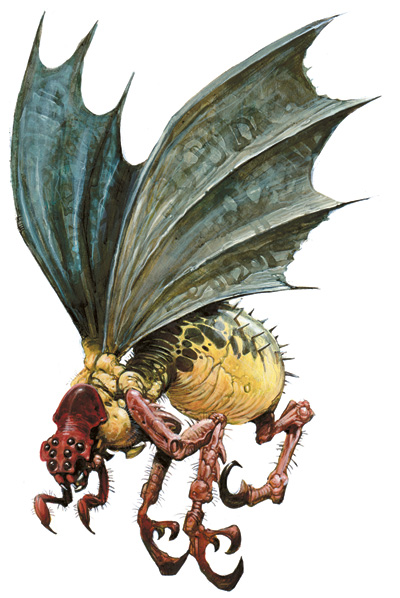 Large Magical Beast Hit
Dice: 4d10+20 (42 hp) Initiative:
+1 Speed: 30 ft. (6 squares),
fly 60
ft. (good) Armor Class: 14 (–1
size, +1 Dex,
+4 natural), touch 10, flatfooted 13 Base
Attack/Grapple: +4/+13 Attack:
Sting +8 melee (1d8+5
plus poison) Full Attack: Sting
+8 melee
(1d8+5 plus poison) and bite +3 melee (1d8+2) Space/Reach: 10 ft./5 ft. Special Attacks: Implant, poison Special Qualities: Darkvision 60
ft., freedom of movement, lowlight vision, scent Saves: Fort +9, Ref +5, Will +2 Abilities: Str 21, Dex 13, Con
21, Int 2, Wis 12, Cha 10 Skills:
Listen +10, Spot +11 Feats:
Alertness, Dodge Environment:
Temperate forests Organization:
Solitary Challenge Rating: 5
Treasure: None Alignment: Always neutral Advancement: 5–12 HD (Huge) Level Adjustment: —
Large Magical Beast Hit
Dice: 4d10+20 (42 hp) Initiative:
+1 Speed: 30 ft. (6 squares),
fly 60
ft. (good) Armor Class: 14 (–1
size, +1 Dex,
+4 natural), touch 10, flatfooted 13 Base
Attack/Grapple: +4/+13 Attack:
Sting +8 melee (1d8+5
plus poison) Full Attack: Sting
+8 melee
(1d8+5 plus poison) and bite +3 melee (1d8+2) Space/Reach: 10 ft./5 ft. Special Attacks: Implant, poison Special Qualities: Darkvision 60
ft., freedom of movement, lowlight vision, scent Saves: Fort +9, Ref +5, Will +2 Abilities: Str 21, Dex 13, Con
21, Int 2, Wis 12, Cha 10 Skills:
Listen +10, Spot +11 Feats:
Alertness, Dodge Environment:
Temperate forests Organization:
Solitary Challenge Rating: 5
Treasure: None Alignment: Always neutral Advancement: 5–12 HD (Huge) Level Adjustment: —
A spider eater is about 10 feet long and 4 feet high, and has a wingspan of about 20 feet. It weighs about 4,000 pounds.
COMBAT
A spider eater attacks with its venomous sting and powerful mandibles. Its usual tactic is to deliver a sting, then back off, hovering out of reach until the venom takes effect.
Implant (Ex): Female spider eaters lay their eggs inside paralyzed creatures of Large or larger size. The young emerge about six weeks later, literally devouring the host from inside.
Poison (Ex): Injury, Fortitude DC 17, initial damage none, secondary damage paralysis for 1d8+5 weeks. The save DC is Constitution-based.
Freedom of Movement (Su): Spider eaters have a continuous freedom of movement ability as the spell (caster level 12th). When the spider eater serves as a mount, this effect does not extend to its rider.
Skills: Spider eaters have a +4 racial bonus on Listen and Spot checks.
TRAINING A SPIDER EATER
A spider eater requires training before it can bear a rider in combat. Training a spider eater requires six weeks of work and a DC 25 Handle Animal check. Riding a spider eater requires an exotic saddle. A spider eater can fight while carrying a rider, but the rider cannot also attack unless he or she succeeds on a Ride check.
Spider eater eggs are worth 2,000 gp apiece on the open market, while young are worth 3,000 gp each. Professional trainers charge 3,000 gp to rear or train a spider eater.
Carrying Capacity: A light load for a spider eater is up to 306 pounds; a medium load, 307–612 pounds; and a heavy load, 613–920 pounds.
SPRITE
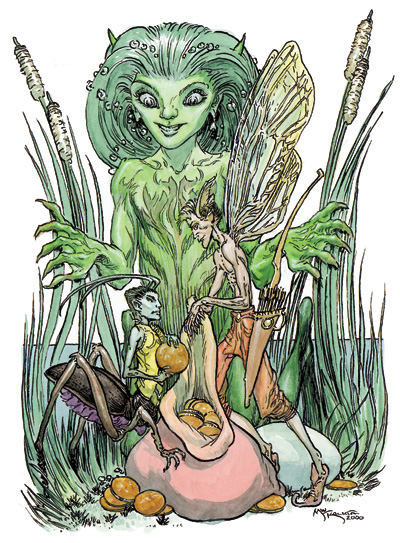
Sprites are reclusive fey. They go out of their way to fight evil and ugliness and to protect their homelands.
Combat
Sprites fight their opponents with spell-like abilities and pintsized weaponry. They prefer ambushes and other trickery over direct confrontation.
Skills: All sprites have a +2 racial bonus on Search, Spot, and Listen checks.
GRIG
Tiny Fey Hit Dice: 1/2 d6+1 (2 hp) Initiative: +4 Speed: 20 ft. (4 squares), fly 40 ft. (poor) Armor Class: 18 (+2 size, +4 Dex, +2 natural), touch 16, flat-footed 16 Base Attack/Grapple: +0/–11 Attack: Short sword +6 melee (1d3–3/19–20) or longbow +6 ranged (1d4–3/x3) Full Attack: Short sword +6 melee (1d3–3/19–20) or longbow +6 ranged (1d4–3/x3) Space/Reach: 2-1/2 ft./0 ft. Special Attacks: Spell-like abilities, fiddle Special Qualities: Damage reduction 5/cold iron, low-light vision, spell resistance 17 Saves: Fort +1, Ref +6, Will +3 Abilities: Str 5, Dex 18, Con 13, Int 10, Wis 13, Cha 14 Skills: Craft (any one) +4, Escape Artist +8, Hide +16, Jump +3, Listen +3, Move Silently +8*, Perform (string instruments) +6, Search +2, Spot +3 Feats: DodgeB, Weapon Finesse Environment: Temperate forests Organization: Gang (2–4), band (6–11), or tribe (20–80) Challenge Rating: 1 Treasure: No coins; 50% goods; 50% items Alignment: Always neutral good Advancement: 1–3 HD (Tiny) Level Adjustment: +3Grigs can leap great distances. They have light blue skin, forest-green hair, and brown hairy legs, and usually wear tunics or brightly colored vests with buttons made from tiny gems. A grig stands 1-1/2 feet tall and weighs about 1 pound.
Grigs speak Sylvan. Some also speak Common.
Combat
Grigs are fierce by sprite standards, attacking opponents fearlessly with bow and dagger.
Spell-Like Abilities: 3/day—disguise self, entangle (DC 13), invisibility (self only), pyrotechnics (DC 14), ventriloquism (DC 13). Caster level 9th. The save DCs are Charisma-based.
Fiddle (Su): One grig in each band carries a tiny, grig-sized fiddle. When the fiddler plays, any nonsprite within 30 feet of the instrument must succeed on a DC 12 Will save or be affected as though by irresistible dance for as long as the playing continues. The save DC is Charisma-based.
Skills: Grigs have a +8 racial bonus on Jump checks. *They also have a +5 racial bonus on Move Silently checks in a forest setting.
NIXIE
Small Fey (Aquatic) Hit Dice: 1d6 (3 hp) Initiative: +3 Speed: 20 ft. (4 squares), swim 30 ft. Armor Class: 14 (+1 size, +3 Dex), touch 14, flat-footed 11 Base Attack/Grapple: +0/–6 Attack: Short sword +4 melee (1d4–2/19–20) or light crossbow +4 ranged (1d6/19–20) Full Attack: Short sword +4 melee (1d4–2/19–20) or light crossbow +4 ranged (1d6/19–20) Space/Reach: 5 ft./5 ft. Special Attacks: Charm person Special Qualities: Amphibious, damage reduction 5/cold iron, low-light vision, spell resistance 16, water breathing, wild empathy Saves: Fort +0, Ref +5, Will +3 Abilities: Str 7, Dex 16, Con 11, Int 12, Wis 13, Cha 18 Skills: Bluff +8, Craft (any one) +5, Escape Artist +6, Handle Animal +8, Hide +7*, Listen +6, Perform (sing) +7, Search +3, Sense Motive +5, Spot +6, Swim +6 Feats: DodgeB, Weapon Finesse Environment: Temperate aquatic Organization: Gang (2–4), band (6–11), or tribe (20–80) Challenge Rating: 1 Treasure: No coins; 50% goods (metal or stone only); 50% items (no scrolls) Alignment: Always neutral Advancement: 2–3 HD (Small) Level Adjustment: +3Most nixies are slim and comely, with lightly scaled, pale green skin and dark green hair. Females often twine shells and pearl strings in their hair and dress in wraps woven from colorful seaweed. Males wear loincloths of the same materials. Nixies prefer not to leave their lakes.
A nixie stands about 4 feet tall and weighs about 45 pounds.
Nixies speak Aquan and Sylvan. Some also speak Common.
Combat
Nixies rely on their charm person ability to deter enemies, entering combat only to protect themselves and their territory.
Charm Person (Sp): A nixie can use charm person three times per day as the spell (caster level 4th). Those affected must succeed on a DC 15 Will save or be charmed for 24 hours. Most charmed creatures are used to perform heavy labor, guard duty, and other onerous tasks for the nixie community. Shortly before the effect wears off, the nixie escorts the charmed creature away and orders it to keep walking. The save DC is Charisma-based.
Amphibious (Ex): Although nixies are aquatic, they can survive indefinitely on land.
Water Breathing (Sp): Once per day a nixie can use water breathing as the spell (caster level 12th). Nixies usually bestow this effect on those they have charmed.
Wild Empathy (Ex): This ability works like the druid’s wild empathy class feature, except that a nixie has a +6 racial bonus on the check.
Skills: A nixie has a +8 racial bonus on any Swim check to perform some special action or avoid a hazard. It can always choose to take 10 on a Swim check, even if distracted or endangered. It can use the run action while swimming, provided it swims in a straight line.
*Nixies have a +5 racial bonus on Hide checks when in the water.
PIXIE
Small Fey Hit Dice: 1d6 (3 hp) Initiative: +4 Speed: 20 ft. (4 squares), fly 60 ft. (good) Armor Class: 16 (+1 size, +4 Dex, +1 natural), touch 15, flat-footed 12 Base Attack/Grapple: +0/–6 Attack: Short sword +5 melee (1d4–2/19–20) or longbow +5 ranged (1d6–2/x3) Full Attack: Short sword +5 melee (1d4–2/19–20) or longbow +5 ranged (1d6–2)/x3 Space/Reach: 5 ft./5 ft. Special Attacks: Spell-like abilities, special arrows Special Qualities: Damage reduction 10/cold iron, greater invisibility, low-light vision, spell resistance 15 Saves: Fort +0, Ref +6, Will +4 Abilities: Str 7, Dex 18, Con 11, Int 16, Wis 15, Cha 16 Skills: Bluff +7, Concentration +4, Escape Artist +8, Hide +8, Listen +8, Move Silently +8, Ride +8, Search +9, Sense Motive +6, Spot +8 Feats: DodgeB, Weapon Finesse Environment: Temperate forests Organization: Gang (2–4), band (6–11), or tribe (20–80) Challenge Rating: 4 (5 with irresistible dance) Treasure: No coins; 50% goods; 50% items Alignment: Always neutral good Advancement: 2–3 HD (Small) Level Adjustment: +4 (+6 with irresistible dance)Pixies wear bright clothing, often including a cap and shoes with curled and pointed toes.
A pixie stands about 2-1/2 feet tall and weighs about 30 pounds.
Pixies speak Sylvan and Common, and may know other languages as well.
Combat
The normally carefree pixies ferociously attack evil creatures and unwanted intruders. They take full advantage of their invisibility and other abilities to harass and drive away opponents.
Greater Invisibility (Su): A pixie remains invisible even when it attacks. This ability is constant, but the pixie can suppress or resume it as a free action.
Spell-Like Abilities: 1/day—lesser confusion (DC 14), dancing lights, detect chaos, detect good, detect evil, detect law, detect thoughts (DC 15), dispel magic, entangle (DC 14), permanent image (DC 19; visual and auditory elements only), polymorph (self only). Caster level 8th. The save DCs are Charisma-based.
One pixie in ten can use irresistible dance (caster level 8th) once per day.
Special Arrows (Ex): Pixies sometimes employ arrows that deal no damage but can erase memory or put a creature to sleep.
Memory Loss: An opponent struck by this arrow must succeed on a DC 15 Will save or lose all memory. The save DC is Charisma-based and includes a +2 racial bonus. The subject retains skills, languages, and class abilities but forgets everything else until he or she receives a heal spell or memory restoration with limited wish, wish, or miracle.
Sleep: Any opponent struck by this arrow, regardless of Hit Dice, must succeed on a DC 15 Fortitude save or be affected as though by a sleep spell. The save DC is Charisma-based and includes a +2 racial bonus.
Pixies as Characters
A pixie character exchanges its 1 HD of fey for its first class level.
Pixie characters possess the following racial traits.
— –4 Strength, +8 Dexterity, +6 Intelligence, +4 Wisdom, +6 Charisma.
—Small size. +1 bonus to Armor Class, +1 bonus on attack rolls, +4 bonus on Hide checks, –4 penalty on grapple checks, lifting and carrying limits 3/4 those of Medium characters.
—A pixie’s base land speed is 20 feet. It also has a fly speed of 60 feet (good).
—Low-light vision.
—Skills: Pixies have a +2 racial bonus on Listen, Search, and Spot checks.
—Racial Feats: A pixie receives Dodge as a bonus feat.
— +1 natural armor bonus.
—Special Attacks (see above): Spell-like abilities.
—Special Qualities (see above): Damage reduction 10/cold iron, greater invisibility, spell resistance equal to 15 + class levels.
—Automatic Languages: Common, Sylvan. Bonus Languages: Elven, Gnome, Halfling.
—Favored Class: Sorcerer.
—Level adjustment +4 (+6 if the pixie can use irresistible dance).
STIRGE
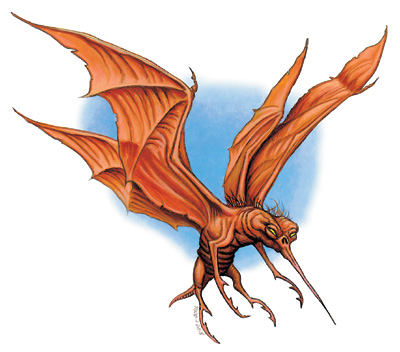 Tiny Magical Beast Hit
Dice: 1d10 (5 hp) Initiative:
+4 Speed: 10 ft (2 squares),
fly 40
ft. (average) Armor Class: 16
(+2 size, +4
Dex), touch 16, flat-footed 12 Base
Attack/Grapple: +1/–11 (+1
when attached) Attack: Touch +7
melee (attach) Full Attack:
Touch +7 melee
(attach) Space/Reach: 2-1/2
ft./0 ft. Special Attacks:
Attach, blood
drain Special Qualities:
Darkvision 60
ft., low-light vision Saves:
Fort +2, Ref +6, Will +1 Abilities:
Str 3, Dex 19, Con 10,
Int 1, Wis 12, Cha 6 Skills:
Hide +14, Listen +4, Spot
+4 Feats: Alertness, Weapon
Finesse B Environment: Warm
marshes Organization: Colony
(2–4), flock
(5–8), or storm (9–14) Challenge
Rating: 1/2 Treasure: None
Alignment: Always neutral Advancement: — Level Adjustment: —
Tiny Magical Beast Hit
Dice: 1d10 (5 hp) Initiative:
+4 Speed: 10 ft (2 squares),
fly 40
ft. (average) Armor Class: 16
(+2 size, +4
Dex), touch 16, flat-footed 12 Base
Attack/Grapple: +1/–11 (+1
when attached) Attack: Touch +7
melee (attach) Full Attack:
Touch +7 melee
(attach) Space/Reach: 2-1/2
ft./0 ft. Special Attacks:
Attach, blood
drain Special Qualities:
Darkvision 60
ft., low-light vision Saves:
Fort +2, Ref +6, Will +1 Abilities:
Str 3, Dex 19, Con 10,
Int 1, Wis 12, Cha 6 Skills:
Hide +14, Listen +4, Spot
+4 Feats: Alertness, Weapon
Finesse B Environment: Warm
marshes Organization: Colony
(2–4), flock
(5–8), or storm (9–14) Challenge
Rating: 1/2 Treasure: None
Alignment: Always neutral Advancement: — Level Adjustment: —
A stirge’s coloration ranges from rust-red to reddish-brown, with a dirty yellow underside. The proboscis is pink at the tip, fading to gray at its base.
A stirge’s body is about 1 foot long, with a wingspan of about 2 feet. It weighs about 1 pound.
COMBAT
A stirge attacks by landing on a victim, finding a vulnerable spot, and plunging its proboscis into the flesh. This is a touch attack and can target only Small or larger creatures.
Attach (Ex): If a stirge hits with a touch attack, it uses its eight pincers to latch onto the opponent’s body. An attached stirge is effectively grappling its prey. The stirge loses its Dexterity bonus to AC and has an AC of 12, but holds on with great tenacity. Stirges have a +12 racial bonus on grapple checks (already figured into the Base Attack/Grapple entry above).
An attached stirge can be struck with a weapon or grappled itself. To remove an attached stirge through grappling, the opponent must achieve a pin against the stirge.
Blood Drain (Ex): A stirge drains blood, dealing 1d4 points of Constitution damage in any round when it begins its turn attached to a victim. Once it has dealt 4 points of Constitution damage, it detaches and flies off to digest the meal. If its victim dies before the stirge’s appetite has been sated, the stirge detaches and seeks a new target.
SWARM
Swarms are dense masses of Fine, Diminutive, or Tiny creatures that would not be particularly dangerous in small groups, but can be terrible foes when gathered in sufficient numbers. For game purposes a swarm is defined as a single creature with a space of 10 feet—gigantic hordes are actually composed of dozens of swarms in close proximity. A swarm has a single pool of Hit Dice and hit points, a single initiative modifier, a single speed, and a single Armor Class. It makes saving throws as a single creature.
Many different creatures can mass as swarms; bat swarms, centipede swarms, hellwasp swarms, locust swarms, rat swarms, and spider swarms are described here. The swarm’s type varies with the nature of the component creature (most are animals or vermin), but all swarms have the swarm subtype.
A swarm of Tiny creatures consists of 300 nonflying creatures or 1,000 flying creatures. A swarm of Diminutive creatures consists of 1,500 nonflying creatures or 5,000 flying creatures. A swarm of Fine creatures consists of 10,000 creatures, whether they are flying or not. Swarms of nonflying creatures include many more creatures than could normally fit in a 10-foot square based on their normal space, because creatures in a swarm are packed tightly together and generally crawl over each other and their prey when moving or attacking. Larger swarms are represented by multiples of single swarms. A large swarm is completely shapeable, though it usually remains contiguous.
COMBAT
In order to attack, a single swarm moves into opponents’ spaces, which provokes an attack of opportunity. It can occupy the same space as a creature of any size, since it crawls all over its prey, but remains a creature with a 10-foot space. Swarms never make attacks of opportunity, but they can provoke attacks of opportunity.
Unlike other creatures with a 10-foot space, a swarm is shapeable. It can occupy any four contiguous squares, and it can squeeze through any space large enough to contain one of its component creatures.
Vulnerabilities of Swarms
Swarms are extremely difficult to fight with physical attacks. However, they have a few special vulnerabilities, as follows:
A lit torch swung as an improvised weapon deals 1d3 points of fire damage per hit.
A weapon with a special ability such as flaming or frost deals its full energy damage with each hit, even if the weapon’s normal damage can’t affect the swarm.
A lit lantern can be used as a thrown weapon, dealing 1d4 points of fire damage to all creatures in squares adjacent to where it breaks.
BAT SWARM
Diminutive Animal (Swarm) Hit Dice: 3d8 (13 hp) Initiative: +2 Speed: 5 ft. (1 square), fly 40 ft. (good) Armor Class: 16 (+4 size, +2 Dex), touch 14, flat-footed 12 Base Attack/Grapple: +2/— Attack: Swarm (1d6) Full Attack: Swarm (1d6) Space/Reach: 10 ft./0 ft. Special Attacks: Distraction, wounding Special Qualities: Blindsense 20 ft., half damage from slashing and piercing, low-light vision, swarm traits Saves: Fort +3, Ref +7, Will +3 Abilities: Str 3, Dex 15, Con 10, Int 2, Wis 14, Cha 4 Skills: Listen +11, Spot +11 Feats: Alertness, Lightning Reflexes Environment: Temperate deserts Organization: Solitary, flight (2–4 swarms), or colony (11–20 swarms) Challenge Rating: 2 Treasure: None Alignment: Always neutral Advancement: None Level Adjustment: —A bat swarm is nocturnal, and is never found aboveground in daylight.
Combat
A bat swarm seeks to surround and attack any warm-blooded prey it encounters. The swarm deals 1d6 points of damage to any creature whose space it occupies at the end of its move.
Distraction (Ex): Any living creature that begins its turn with a swarm in its space must succeed on a DC 11 Fortitude save or be nauseated for 1 round. The save DC is Constitution-based.
Wounding (Ex): Any living creature damaged by a bat swarm continues to bleed, losing 1 hit point per round thereafter. Multiple wounds do not result in cumulative bleeding loss. The bleeding can be stopped by a DC 10 Heal check or the application of a cure spell or some other healing magic.
Blindsense (Ex): A bat swarm notices and locates creatures within 20 feet. Opponents still have total concealment against the bat swarm (but swarm attacks ignore concealment).
Skills: A bat swarm has a +4 racial bonus on Listen and Spot checks. These bonuses are lost if its blindsense is negated.
CENTIPEDE SWARM
Diminutive Vermin (Swarm) Hit Dice: 9d8–9 (31 hp) Initiative: +4 Speed: 20 ft. (4 squares), climb 20 ft. Armor Class: 18 (+4 size, +4 Dex), touch 18, flat-footed 14 Base Attack/Grapple: +6/— Attack: Swarm (2d6 plus poison) Full Attack: Swarm (2d6 plus poison) Space/Reach: 10 ft./0 ft. Special Attacks: Distraction, poison Special Qualities: Darkvision 60 ft., immune to weapon damage, swarm traits, tremorsense 30 ft., vermin traits Saves: Fort +5, Ref +7, Will +3 Abilities: Str 1, Dex 19, Con 8, Int —, Wis 10, Cha 2 Skills: Climb +12, Spot +4 Feats: Weapon FinesseB Environment: Underground Organization: Solitary, tangle (2–4 swarms), or colony (7–12 swarms) Challenge Rating: 4 Treasure: None Alignment: Always neutral Advancement: None Level Adjustment: —Combat
A centipede swarm seeks to surround and attack any living prey it encounters. A swarm deals 2d6 points of damage to any creature whose space it occupies at the end of its move.
Distraction (Ex): Any living creature that begins its turn with a centipede swarm in its space must succeed on a DC 13 Fortitude save or be nauseated for 1 round. The save DC is Constitution-based.
Poison (Ex): Injury, Fortitude DC 13, initial and secondary damage 1d4 Dex. The save DC is Constitution-based.
Skills: A centipede swarm has a +4 racial bonus on Spot checks and a +8 racial bonus on Climb checks, and uses its Dexterity modifier instead of its Strength modifier for Climb checks. A centipede swarm has a +8 racial bonus on Climb checks and can always choose to take 10 on a Climb check, even if rushed or threatened.
HELLWASP SWARM
Diminutive Magical Beast (Extraplanar, Evil, Swarm) Hit Dice: 12d10+27 (93 hp) Initiative: +10 Speed: 5 ft. (1 square), fly 40 ft. Armor Class: 20 (+4 size, +6 Dex), touch 20, flat-footed 14 Base Attack/Grapple: +12/— Attack: Swarm (3d6 plus poison) Full Attack: Swarm (3d6 plus poison) Space/Reach: 10 ft./0 ft. Special Attacks: Distraction, inhabit, poison Special Qualities: Damage reduction 10/magic, darkvision 60 ft., hive mind, immune to weapon damage, resistance to fire 10, low-light vision, swarm traits Saves: Fort +10, Ref +14, Will +7 Abilities: Str 1, Dex 22, Con 14, Int 6, Wis 13, Cha 9 Skills: Hide +19, Listen +10, Spot +10 Feats: Ability Focus (poison), Alertness, Improved Initiative, Iron Will, Toughness Environment: A evil-aligned plane Organization: Solitary, fright (2–4 swarms), or terror (5–8 swarms) Challenge Rating: 8 Treasure: None Alignment: Always lawful evil Advancement: None Level Adjustment: —A single hellwasp resembles a thumb-sized normal wasp, except its carapace is gleaming black with ruby-red stripes, and its compound eyes are an iridescent green. In swarms, hellwasps form a collective hive mind intelligence with infernal cunning and bloodlust.
Combat
Like any swarm, a hellwasp swarm seeks to surround and attack any living prey it encounters. A swarm deals 3d6 points of damage to any creature whose space it occupies at the end of its move. The swarm can take over the bodies of its prey and infest both the living and the dead, using them as horrible living (or unliving) puppets to accomplish acts of wickedness that a swarm of insects could never attempt.
A hellwasp swarm’s attack is treated as an evil-aligned weapon and a magic weapon for the purpose of overcoming damage reduction.
Distraction (Ex): Any living creature that begins its turn with a hellwasp swarm in its space must succeed on a DC 18 Fortitude save or be nauseated for 1 round. The save DC is Constitution-based.
Inhabit (Ex): A hellwasp swarm can enter the body of a helpless or dead creature by crawling into its mouth and other orifices. Inhabiting requires 1 minute, and the victim must be Small, Medium, or Large (although four swarms working together can inhabit a Huge creature). The swarm can abandon the body at any time, although doing this takes 1 full round. Any attack against the host deals half damage to the hellwasp swarm as well, although the swarm’s resistances and immunities may negate some or all of this damage.
If a hellwasp swarm inhabits a dead body, it can restore animation to the creature and control its movements, effectively transforming it into a zombie of the appropriate size for as long as the swarm remains inside. If a hellwasp swarm inhabits a living victim, it can neutralize the effects of its own poison and control the victim’s movement and actions as if using dominate monster on the victim. The hellwasps quickly consume a living victim, dealing 2d4 points of Constitution damage per hour they inhabit a body. A body reduced to Constitution 0 is dead.
A hellwasp-inhabited creature is relatively easy to spot, since its skin crawls with the forms of insects inside. The swarm is intelligent enough to attempt to hide beneath loose clothing or a large cloak to keep its presence from being detected. The swarm can attempt a Disguise check to conceal its inhabitation of a host, with a –4 penalty if currently inhabiting a Small host.
A remove disease or heal spell cast on an inhabited victim forces the hellwasp swarm to abandon its host.
Poison (Ex): Injury, Fortitude DC 18, initial and secondary damage 1d6 Dex. The save DC is Constitution-based.
Hive Mind (Ex): Any hellwasp swarm with at least 1 hit point per Hit Die (or 12 hit points, for a standard hellwasp swarm) forms a hive mind, giving it an Intelligence of 6. When a hellwasp swarm is reduced below this hit point threshold, it becomes mindless.
LOCUST SWARM
Diminutive Vermin (Swarm) Hit Dice: 6d8–6 (21 hp) Initiative: +4 Speed: 10 ft. (2 squares), fly 30 ft. (poor) Armor Class: 18 (+4 size, +4 Dex), touch 18, flat-footed 14 Base Attack/Grapple: +4/— Attack: Swarm (2d6) Full Attack: Swarm (2d6) Space/Reach: 10 ft./0 ft. Special Attacks: Distraction Special Qualities: Darkvision 60 ft., immune to weapon damage, swarm traits, vermin traits Saves: Fort +4, Ref +6, Will +2 Abilities: Str 1, Dex 19, Con 8, Int —, Wis 10, Cha 2 Skills: Listen +4, Spot +4 Feats: — Environment: Temperate plains Organization: Solitary, cloud (2–7 swarms), or plague (11–20 swarms) Challenge Rating: 3 Treasure: None Alignment: Always neutral Advancement: None Level Adjustment: —A locust swarm is a cloud of thousands of winged vermin that devours any organic material in its path.
Combat
A locust swarm surrounds and attacks any living prey it encounters. A swarm deals 2d6 points of damage to any creature whose space it occupies at the end of its move.
Distraction (Ex): Any living creature that begins its turn with a locust swarm in its space must succeed on a DC 12 Fortitude save or be nauseated for 1 round. The save DC is Constitution-based.
Skills: A locust swarm has a +4 racial bonus on Listen and Spot checks.
RAT SWARM
Tiny Animal (Swarm) Hit Dice: 4d8 (13 hp) Initiative: +2 Speed: 15 ft. (3 squares), climb 15 ft. Armor Class: 14 (+2 size, +2 Dex), touch 14, flat-footed 12 Base Attack/Grapple: +3/— Attack: Swarm (1d6 plus disease) Full Attack: Swarm (1d6 plus disease) Space/Reach: 10 ft./0 ft. Special Attacks: Disease, distraction Special Qualities: Half damage from slashing and piercing, low-light vision, scent, swarm traits Saves: Fort +4, Ref +6, Will +2 Abilities: Str 2, Dex 15, Con 10, Int 2, Wis 12, Cha 2 Skills: Balance +10, Climb +10, Hide +14, Listen +6, Spot +7, Swim +10 Feats: Alertness, Weapon Finesse Environment: Any Organization: Solitary, pack (2–4 swarms), or infestation (7–12 swarms) Challenge Rating: 2 Treasure: None Alignment: Always neutral Advancement: None Level Adjustment: —Combat
A rat swarm seeks to surround and attack any warm-blooded prey it encounters. A swarm deals 1d6 points of damage to any creature whose space it occupies at the end of its move.
Disease (Ex): Filth fever—swarm attack, Fortitude DC 12, incubation period 1d3 days, damage 1d3 Dex and 1d3 Con. The save DC is Constitution-based.
Distraction (Ex): Any living creature that begins its turn with a swarm in its square must succeed on a DC 12 Fortitude save or be nauseated for 1 round. The save DC is Constitution-based.
Skills: A rat swarm has a +4 racial bonus on Hide and Move Silently checks, and a +8 racial bonus on Balance, Climb, and Swim checks. A rat swarm can always choose to take 10 on all Climb checks, even if rushed or threatened.
A rat swarm uses its Dexterity modifier instead of its Strength modifier for Climb and Swim checks.
A rat swarm has a +8 racial bonus on any Swim check to perform some special action or avoid a hazard. It can always choose to take 10 on a Swim check, even if distracted or endangered. It can use the run action while swimming, provided it swims in a straight line.
SPIDER SWARM
Diminutive Vermin (Swarm) Hit Dice: 2d8 (9 hp) Initiative: +3 Speed: 20 ft. (4 squares), climb 20 ft. Armor Class: 17 (+4 size, +3 Dex), touch 17, flat-footed 14 Base Attack/Grapple: +1/— Attack: Swarm (1d6 plus poison) Full Attack: Swarm (1d6 plus poison) Space/Reach: 10 ft./0 ft. Special Attacks: Distraction, poison Special Qualities: Darkvision 60 ft., swarm traits, tremorsense 30 ft., vermin traits Saves: Fort +3, Ref +3, Will +0 Abilities: Str 1, Dex 17, Con 10, Int —, Wis 10, Cha 2 Skills: Climb +11, Listen +4, Spot +4 Environment: Warm forests Organization: Solitary, tangle (2–4 swarms), or colony (7–12 swarms) Challenge Rating: 1 Treasure: None Alignment: Always neutral Advancement: None Level Adjustment: —Combat
A spider swarm seeks to surround and attack any living prey it encounters. A swarm deals 1d6 points of damage to any creature whose space it occupies at the end of its move.
Distraction (Ex): Any living creature that begins its turn with a spider swarm in its space must succeed on a DC 11 Fortitude save or be nauseated for 1 round. The save DC is Constitution-based.
Poison (Ex): Injury, Fortitude DC 11, initial and secondary damage 1d3 Str. The save DC is Constitution-based.
Skills: A spider swarm has a +4 racial bonus on Hide and Spot checks and a +8 racial bonus on Climb checks. It uses its Dexterity modifier instead of its Strength modifier for Climb checks. It can always choose to take 10 on a Climb check, even if rushed or threatened.